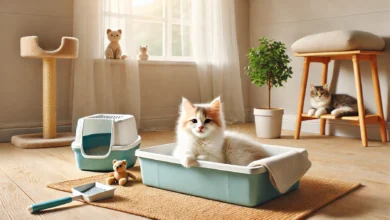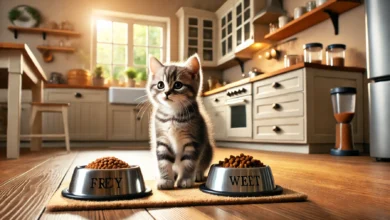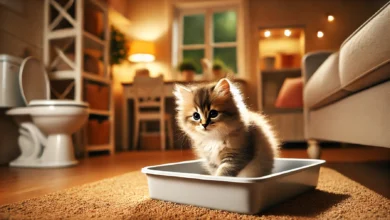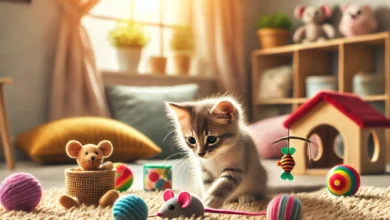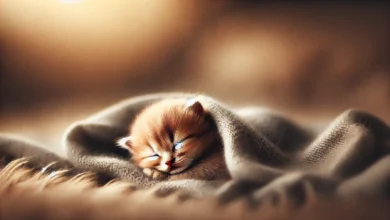Exploring Vaccination Schedules for Kittens
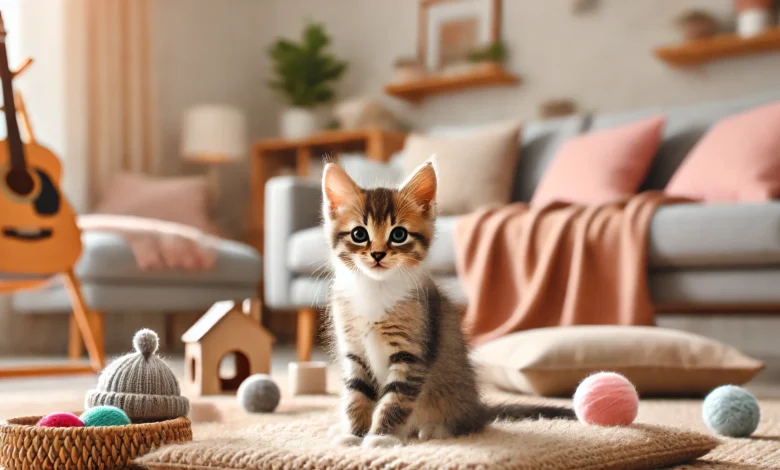
One of the most important things you can do for a new kitten is to get it the proper vaccinations at the proper time.
These vaccination schedules are very important in keeping your kitten safe from several dangerous and common diseases, some of which may even be life-threatening.
But how do you know which vaccines your kitten needs, and when?
The following article will outline the basics of vaccination schedules for kittens, enabling you to make educated decisions about keeping your furry friend safe and healthy.
Early vaccination is critical for a lifetime of health and wellness in your kitten.
Vaccination schedules not only aid in the prevention of diseases caused by different viruses and bacteria, but these diseases can also be highly contagious among cats, especially when there are multiple pets in a household or they are exposed to the outdoors.
But why are vaccinations so important for your kitten?
Table of Contents
Why Vaccinations Are Essential for Kittens
Vaccination is one of the first, but most significant, ways to protect your kitten from illness.
Just like human babies, kittens are born with an underdeveloped immune system.
Though they derive some protection from their mother’s milk, this does not last long after birth, leaving them vulnerable to infections.
This is where vaccination schedules come into play—providing an added boost to their immature immune system and protecting them against serious diseases.
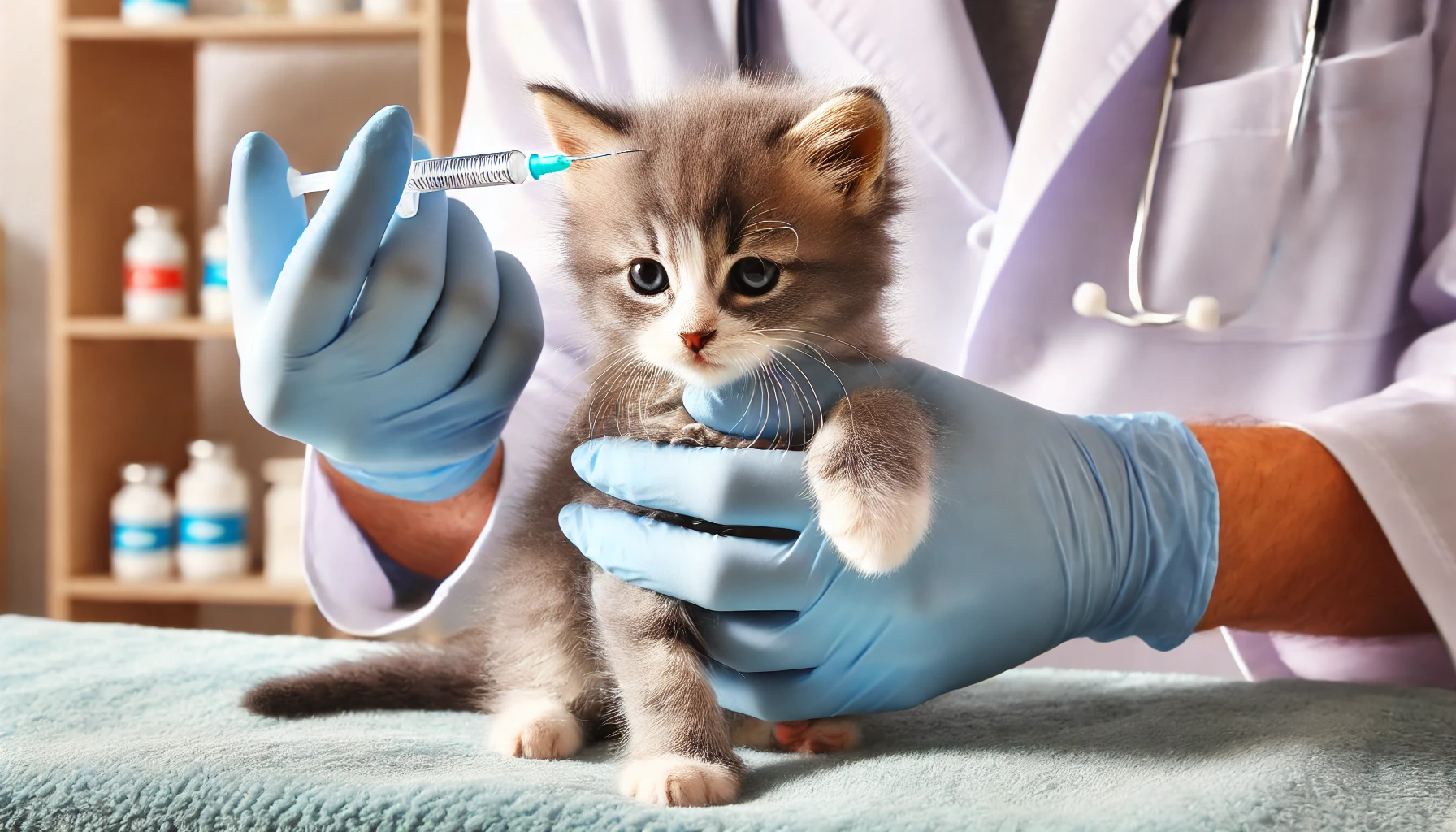
The Importance of Early Vaccination
Kittens are naturally curious and love to explore their environment, which often exposes them to a variety of pathogens.
Early vaccination ensures that their immune system is ready for these possible threats before serious health issues arise.
Starting the vaccination process at six to eight weeks of age provides the best possible start in life for your kitten.
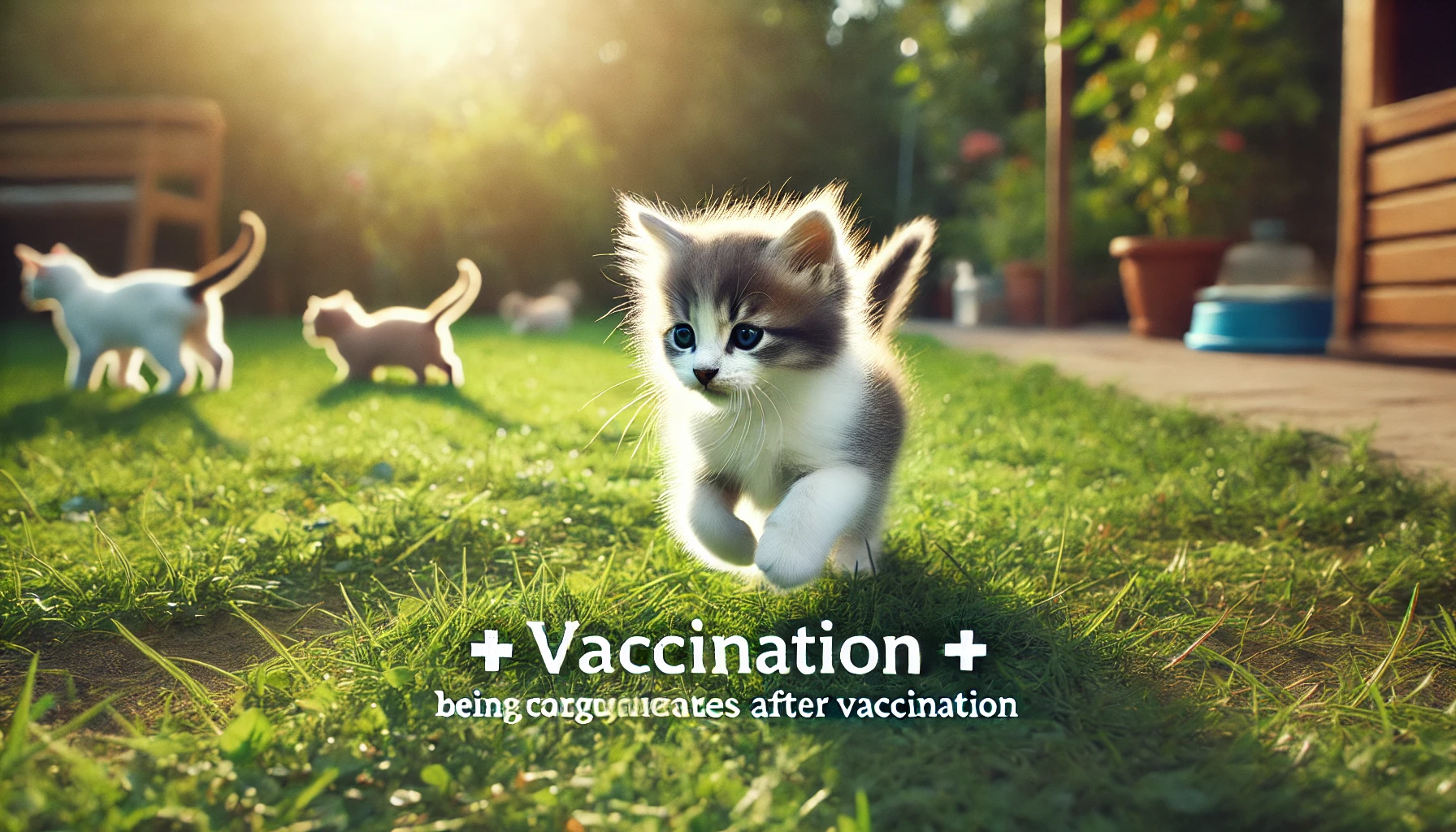
How Vaccinations Protect Your Kitten
Vaccination works by exposing the kitten’s immune system to a small, harmless part of a virus or bacteria, allowing the body to produce antibodies.
These antibodies then provide resistance against the actual virus or bacteria if your kitten is exposed to it later.
By following a proper vaccination schedule, your kitten will have a much lower chance of acquiring diseases like feline distemper, calicivirus, and feline leukemia.
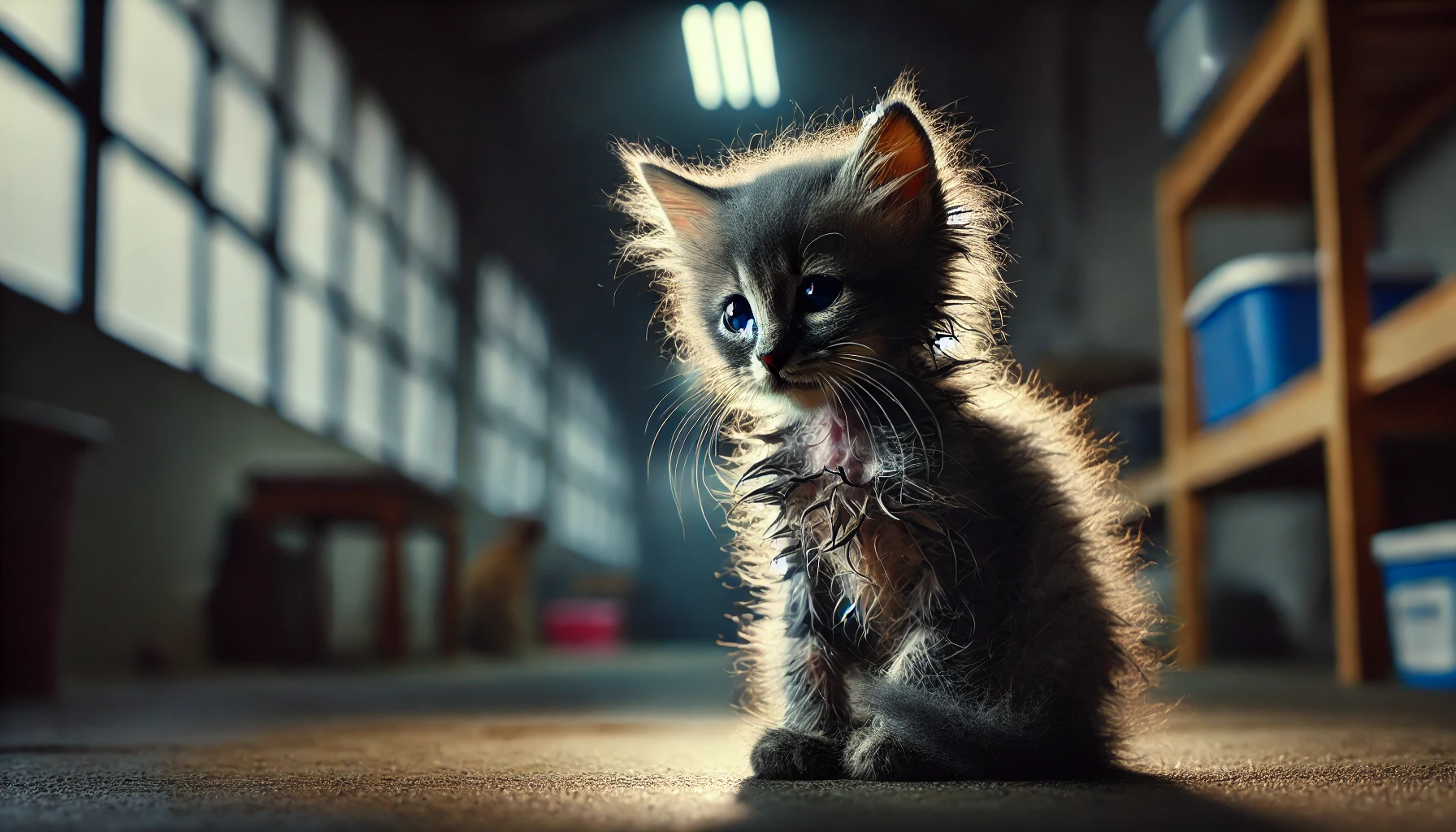
Risks of Neglecting Vaccination Schedules in Kittens
Vaccines protect your kitten from infections that could lead to serious health consequences or even death.
Some diseases, such as feline panleukopenia or rabies, are highly contagious and often fatal.
This can also pose a risk to other cats in your household or neighborhood, as these diseases can easily spread among felines.
By adhering to a recommended vaccination schedule, you will not only protect your kitten but also help prevent outbreaks within the larger cat community.
Now that we’ve covered why vaccinations are essential for kittens, let’s dive deeper into what vaccines your kitten needs as part of their core vaccination schedule.
Vaccinations play a key role in safeguarding your kitten’s health by providing protection from a range of potentially life-threatening diseases.
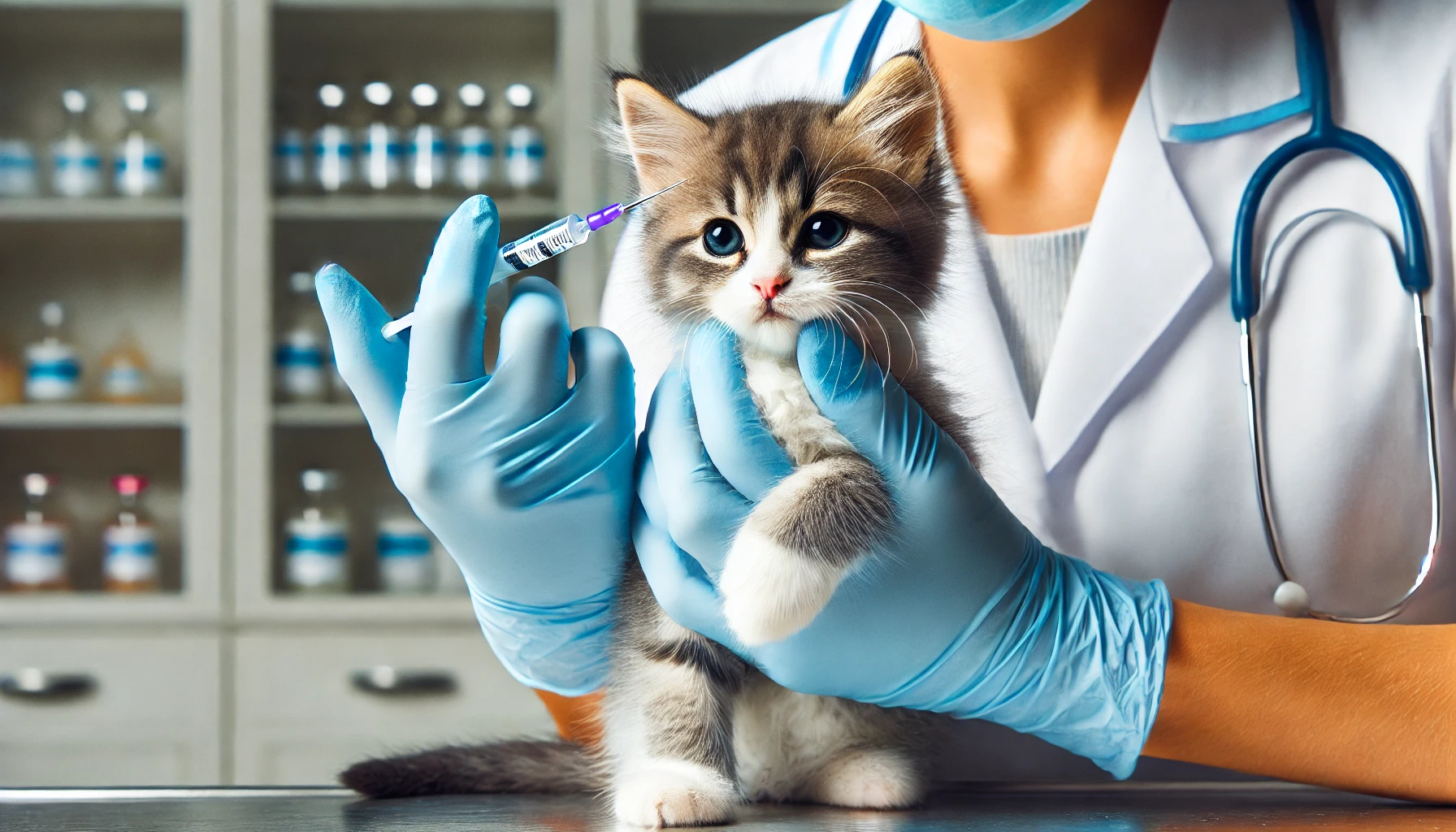
Core Vaccinations for Kittens: What They Comprise Of
The term core vaccinations refers to the shots that all kittens should receive, regardless of their lifestyle or environment.
These vaccination schedules are crucial since they combat highly contagious and serious diseases that can affect all cats.
The core vaccines form a foundation upon which your kitten’s vaccination schedule will be built to ensure your kitten is protected from some of the deadliest feline diseases.
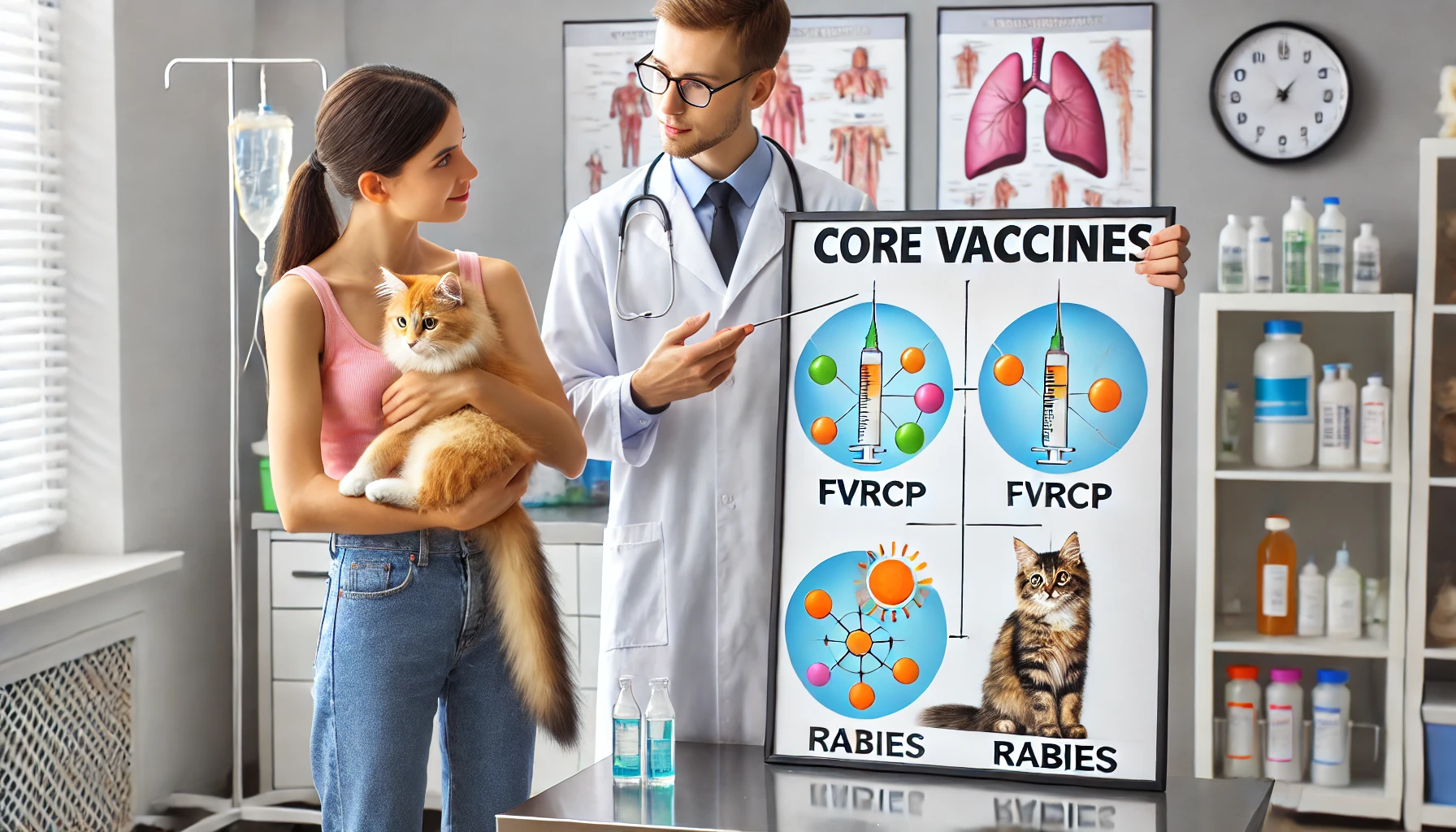
Understanding Core Vaccines
Vaccines against feline panleukopenia, commonly known as feline distemper, along with feline viral rhinotracheitis, feline calicivirus, and rabies, are the typical core vaccines given to kittens.
These diseases are either common or carry a high risk for severe complications, making them essential as core vaccines.
A combination vaccine called FVRCP is commonly administered to kittens for protection against the first three of these diseases.
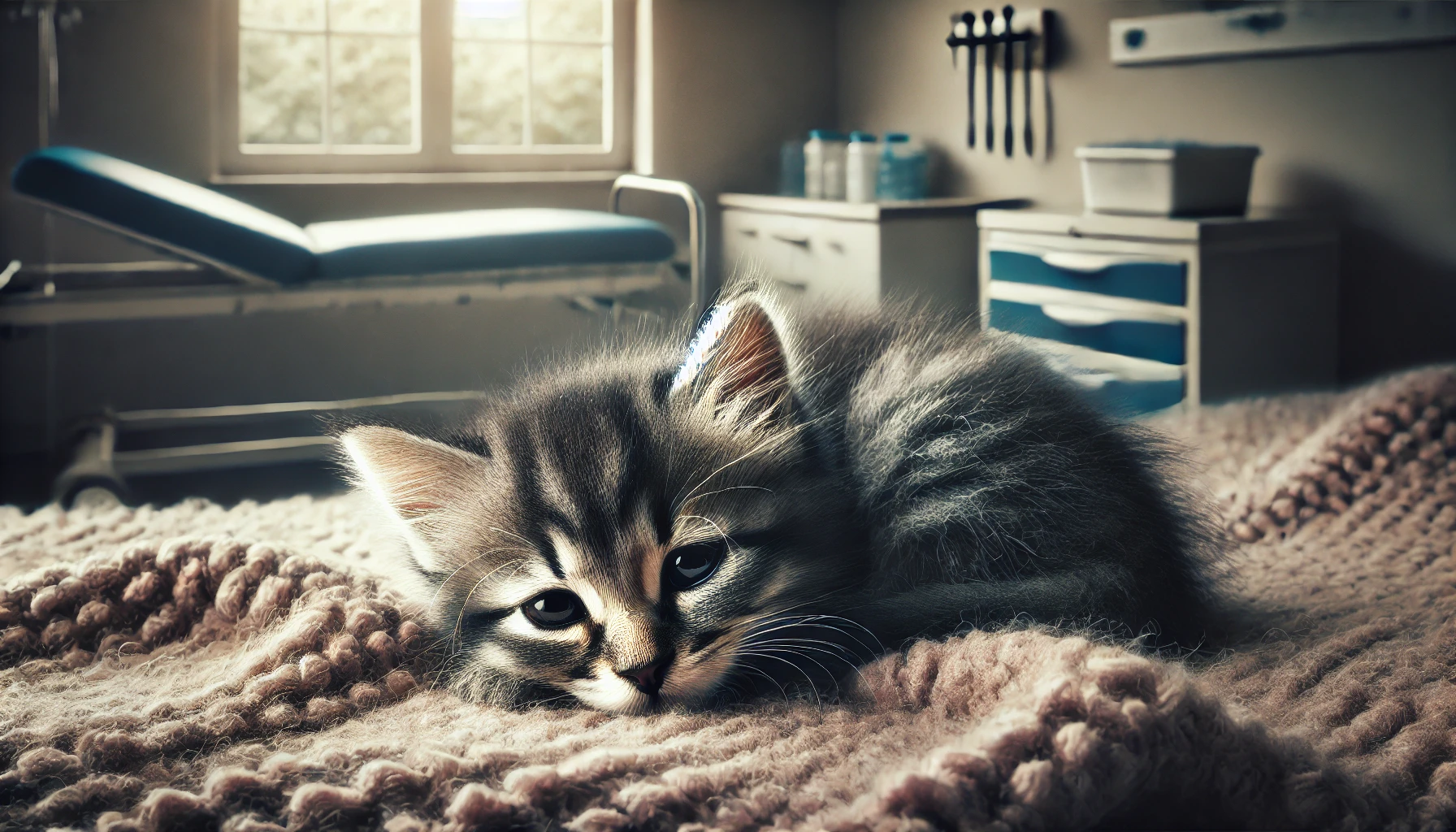
Feline Panleukopenia Virus (FPV)
This highly contagious virus can cause severe dehydration, vomiting, and death in kittens.
The virus attacks the bone marrow, weakening the immune response and making kittens susceptible to secondary infections.
Vaccination is essential to protect your kitten from this often fatal disease.
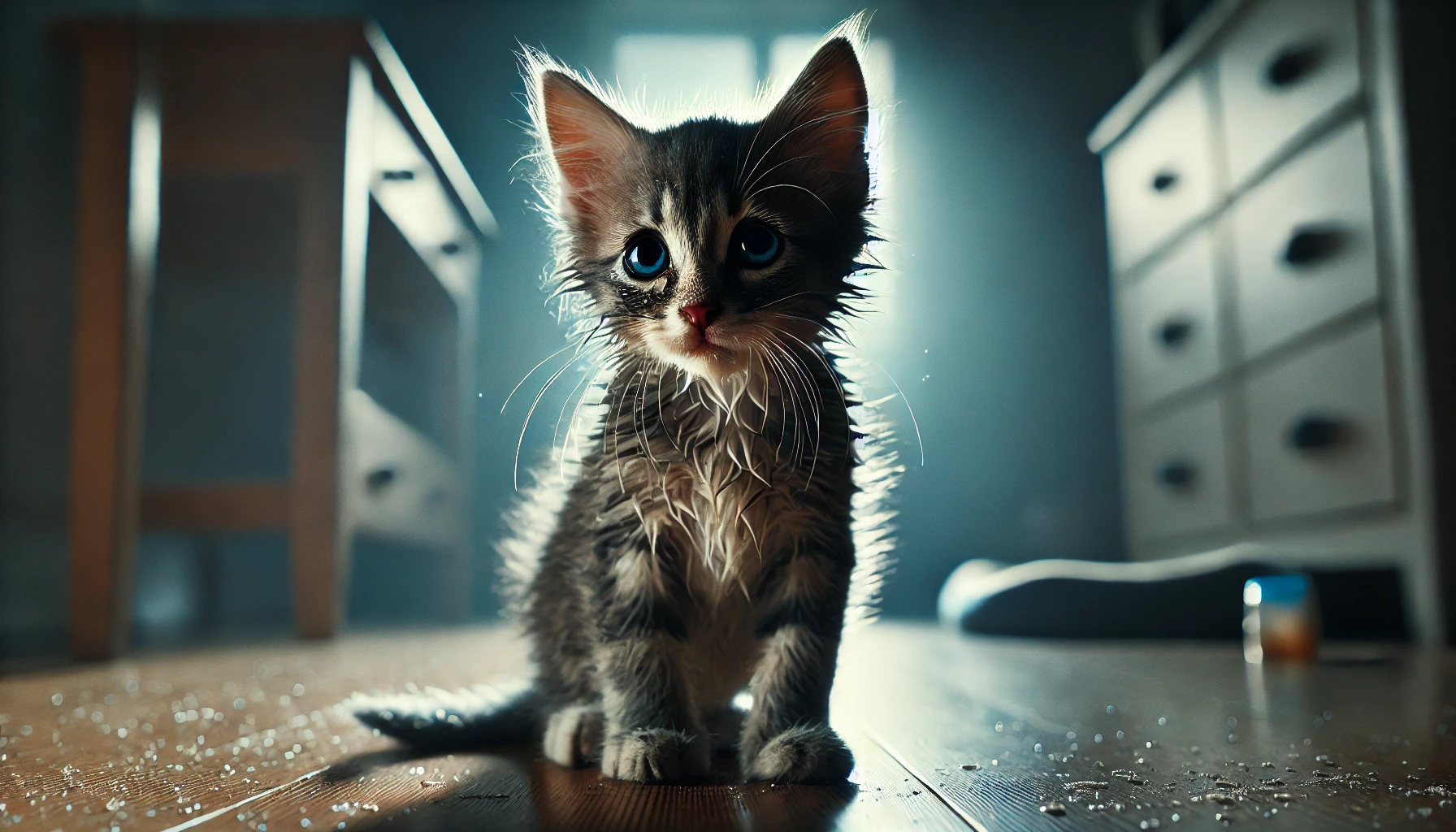
Feline Viral Rhinotracheitis (FVR)
Feline Viral Rhinotracheitis is caused by feline herpesvirus.
This disease primarily affects a kitten’s respiratory system, leading to symptoms such as sneezing, coughing, and nasal discharge.
While typically non-fatal, it can be very distressing and may affect the cat for life.
It is included in the FVRCP complex.
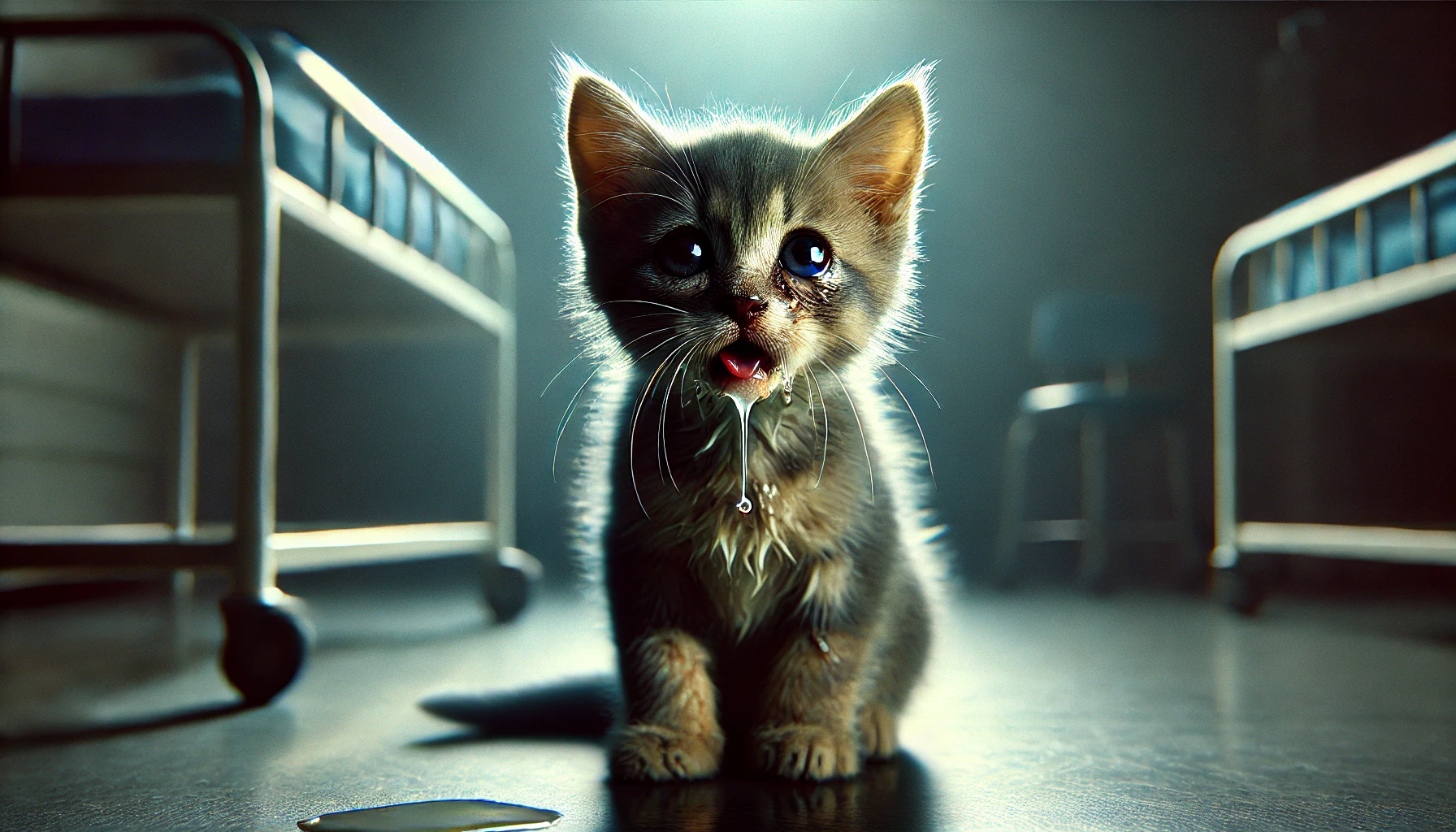
Feline Calicivirus (FCV)
This is another commonly diagnosed respiratory virus.
It causes upper respiratory infections, oral ulcers, and occasionally lameness.
In severe cases, it can lead to pneumonia.
Vaccination helps to reduce the severity of the disease if a kitten develops it.
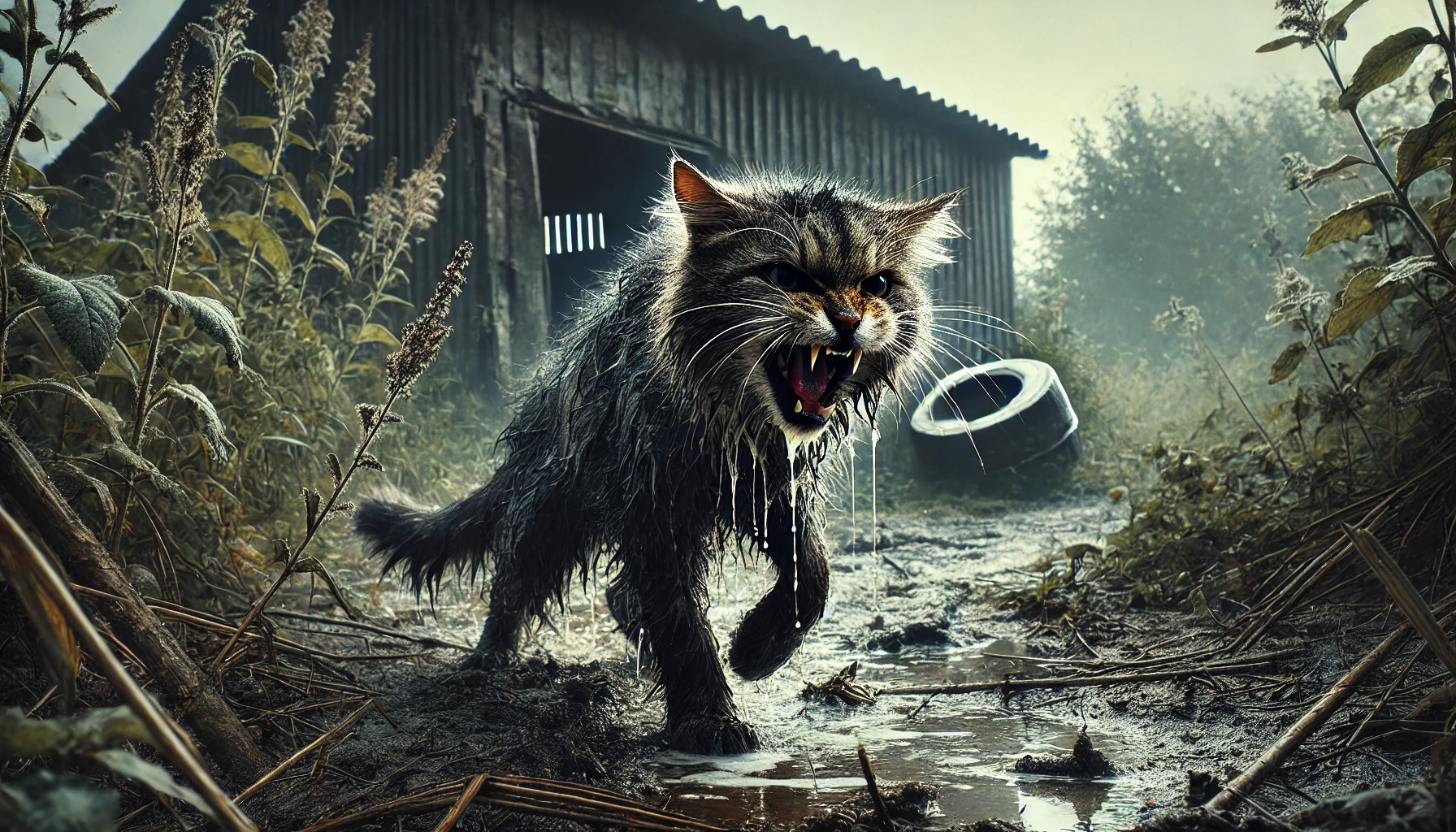
Rabies
Rabies is a fatal viral disease that affects all mammals, including domesticated cats and humans.
It is more common among wild animals, but domestic pets can contract the virus through bites or scratches from infected animals.
Many local governments worldwide require rabies vaccination by law.
These vaccinations offer a strong basis for a core immunization schedule in your kitten’s life, protecting them from some of the most dangerous diseases they may encounter.
Following the vaccination schedule not only protects your kitten but also helps prevent outbreaks within the larger cat population.
Next, we will look at how to schedule these core vaccinations and ensure your kitten receives them at the appropriate times.
Core vaccinations are essential for protecting your kitten against serious and contagious diseases, forming the foundation of their long-term health plan.
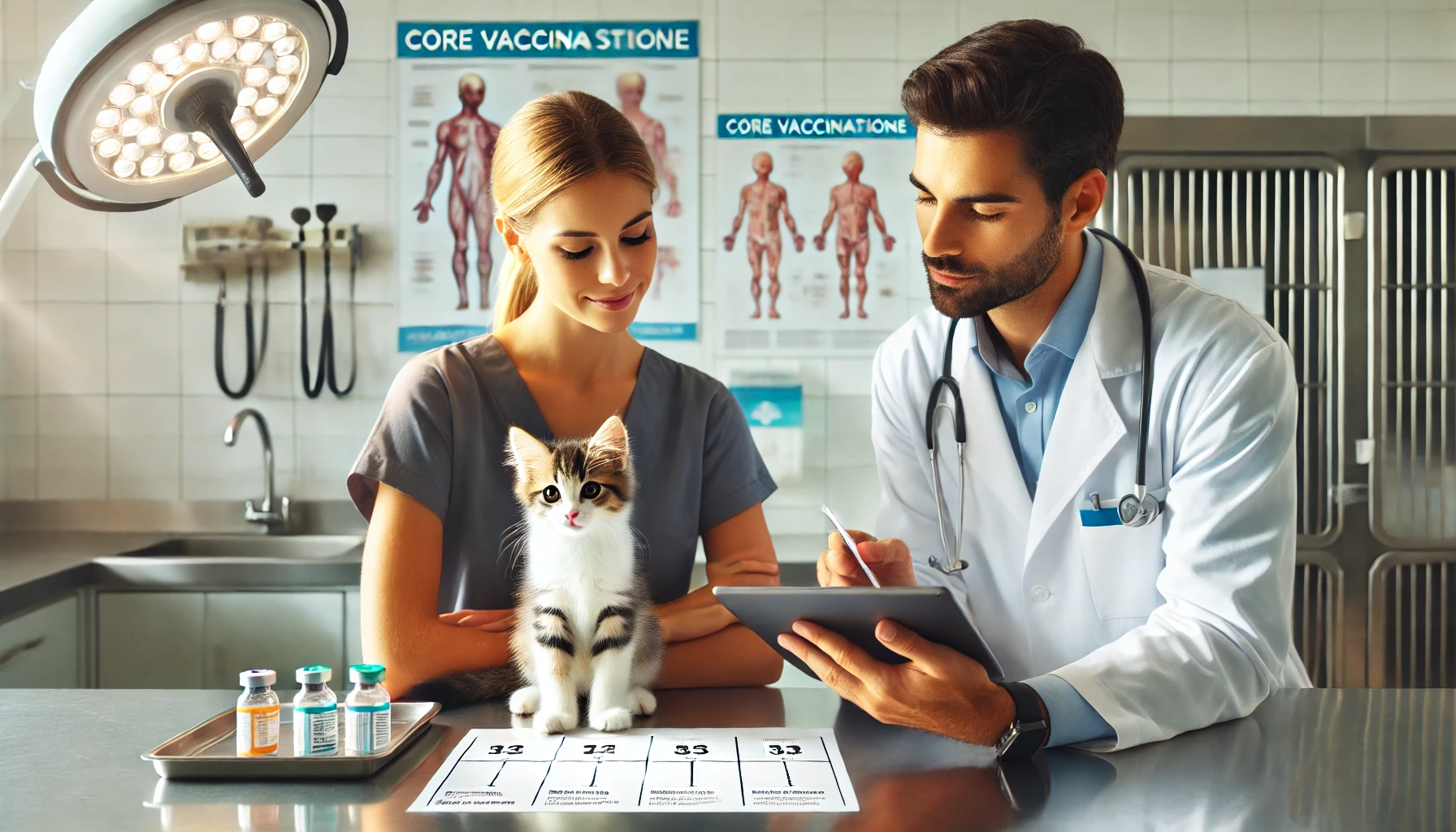
Understanding the Ideal Vaccination Schedule
Pursuing the right vaccination schedule is important to protect your kitten against life-threatening diseases.
Vaccination schedules, which can start as early as six to eight weeks of age, must be followed throughout the first months of their life.
This serves as an immunity booster until their system develops strong protection during their most vulnerable time.
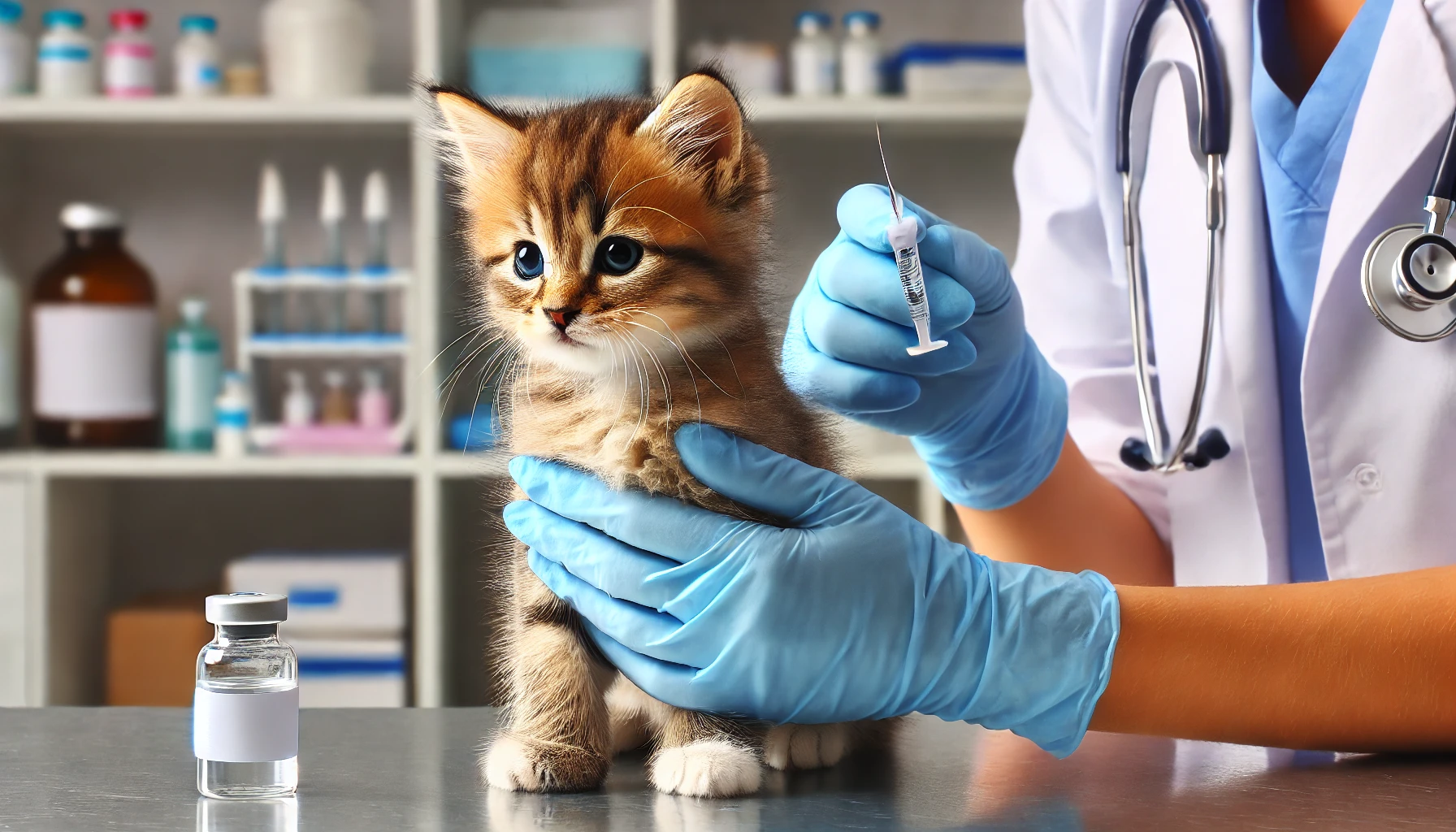
First Vaccination Timeline: 6-8 Weeks
This series of vaccinations typically begins when your kitten is six to eight weeks old.
At this age, your kitten will receive the FVRCP combination vaccine, which offers protection against feline viral rhinotracheitis, calicivirus, and panleukopenia.
This is also known as the ‘core’ vaccine since it protects against some of the most serious and prevalent feline diseases.
- 6-8 weeks: First vaccination of FVRCP
- 10-12 weeks: FVRCP booster, second dose
- 14-16 weeks: Third dose of FVRCP and rabies vaccination
It is crucial to follow this vaccination schedule carefully.
Missing one vaccination can expose your kitten to the risk of contracting these diseases during the early stages of life.
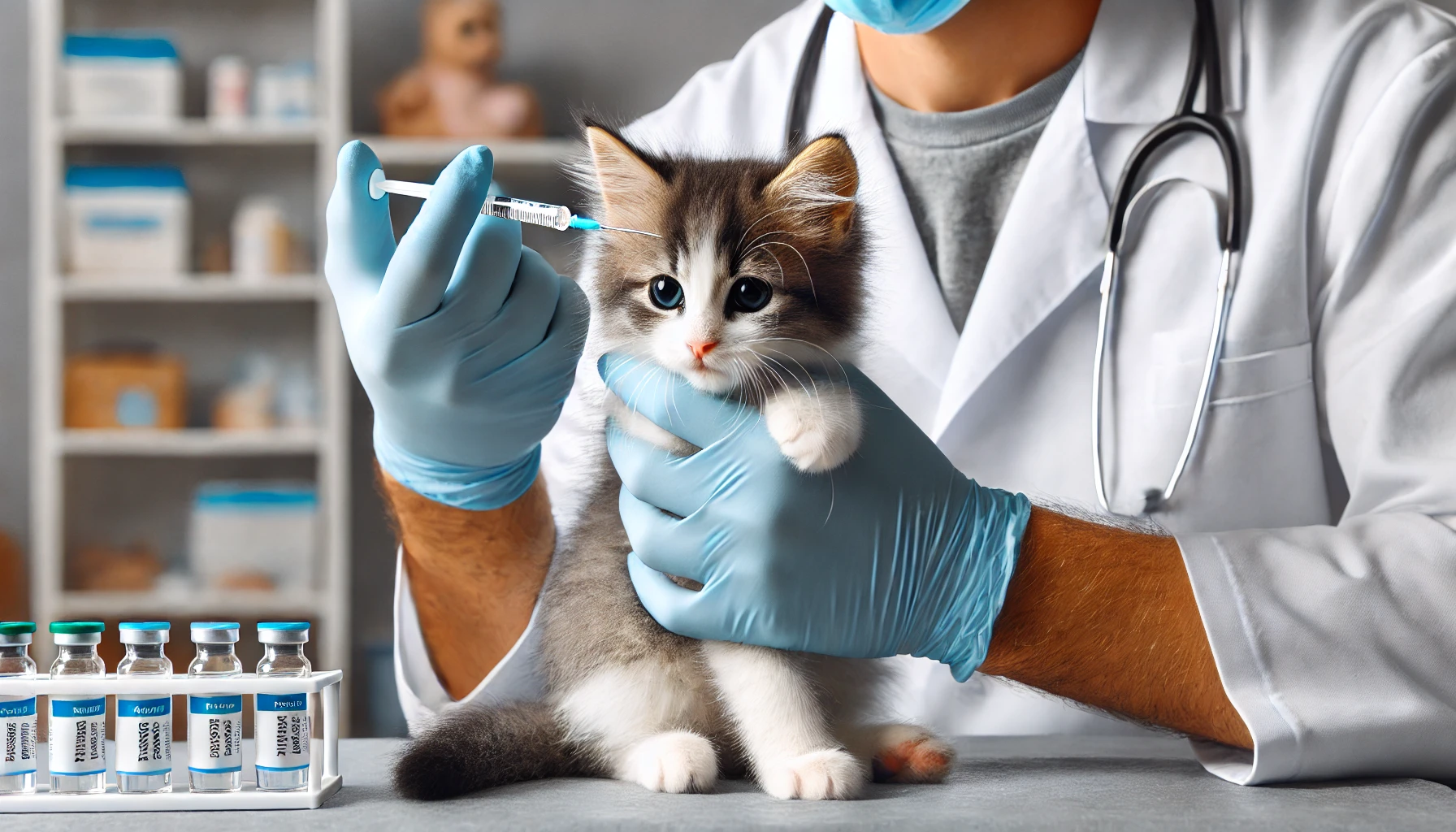
Boosters and Timing for Maximum Protection
Following the initial vaccinations, your kitten will require booster shots at regular intervals to maintain their immunity.
Booster shots can be administered every three to four weeks until your kitten reaches 16 weeks of age.
The rabies vaccine is often given at the same time as the last FVRCP booster.
Once the initial series of vaccinations is completed, booster shots will be required periodically throughout your cat’s life.
This typically means annual boosters, or every three years for some vaccines, depending on your veterinarian’s recommendation.
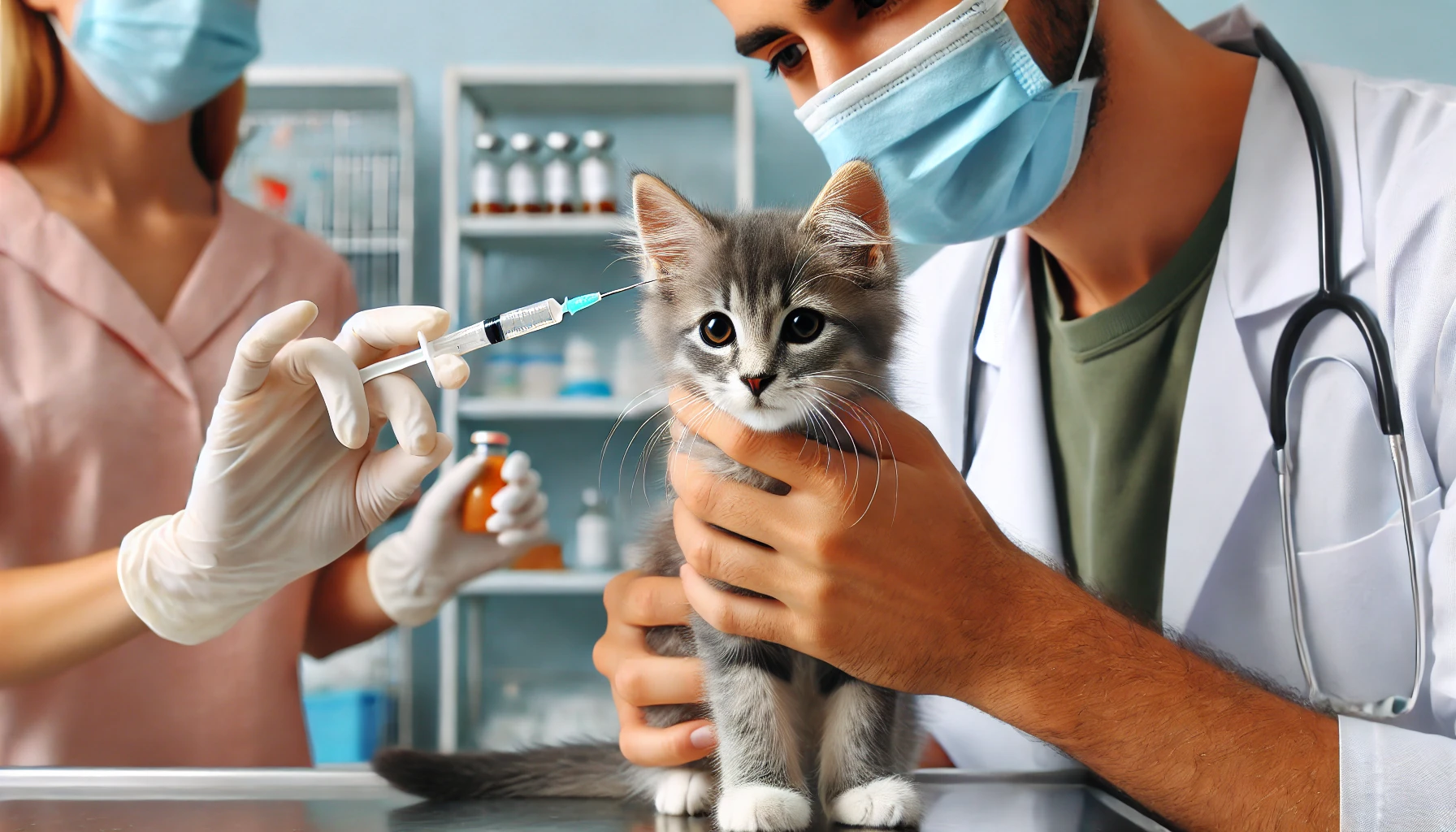
Recommended Vaccines for Older Kittens
If your kitten is older and hasn’t been vaccinated yet, it’s never too late to start.
Older kittens will follow a modified vaccination schedule that begins with the FVRCP and rabies vaccines.
Your veterinarian will create a schedule based on your kitten’s age and health status, ensuring they receive the necessary protection.
It’s essential to work with your vet to establish a specific vaccination plan tailored to your kitten’s needs.
Sticking to a well-planned vaccination schedule will ensure your kitten has the best protection possible against diseases.
Next, we’ll consider optional vaccines and how your kitten’s lifestyle and location can impact their vaccination needs.
Adhering to a recommended vaccination schedule ensures that your kitten gets the right protection at the right time, significantly reducing the risk of serious diseases.
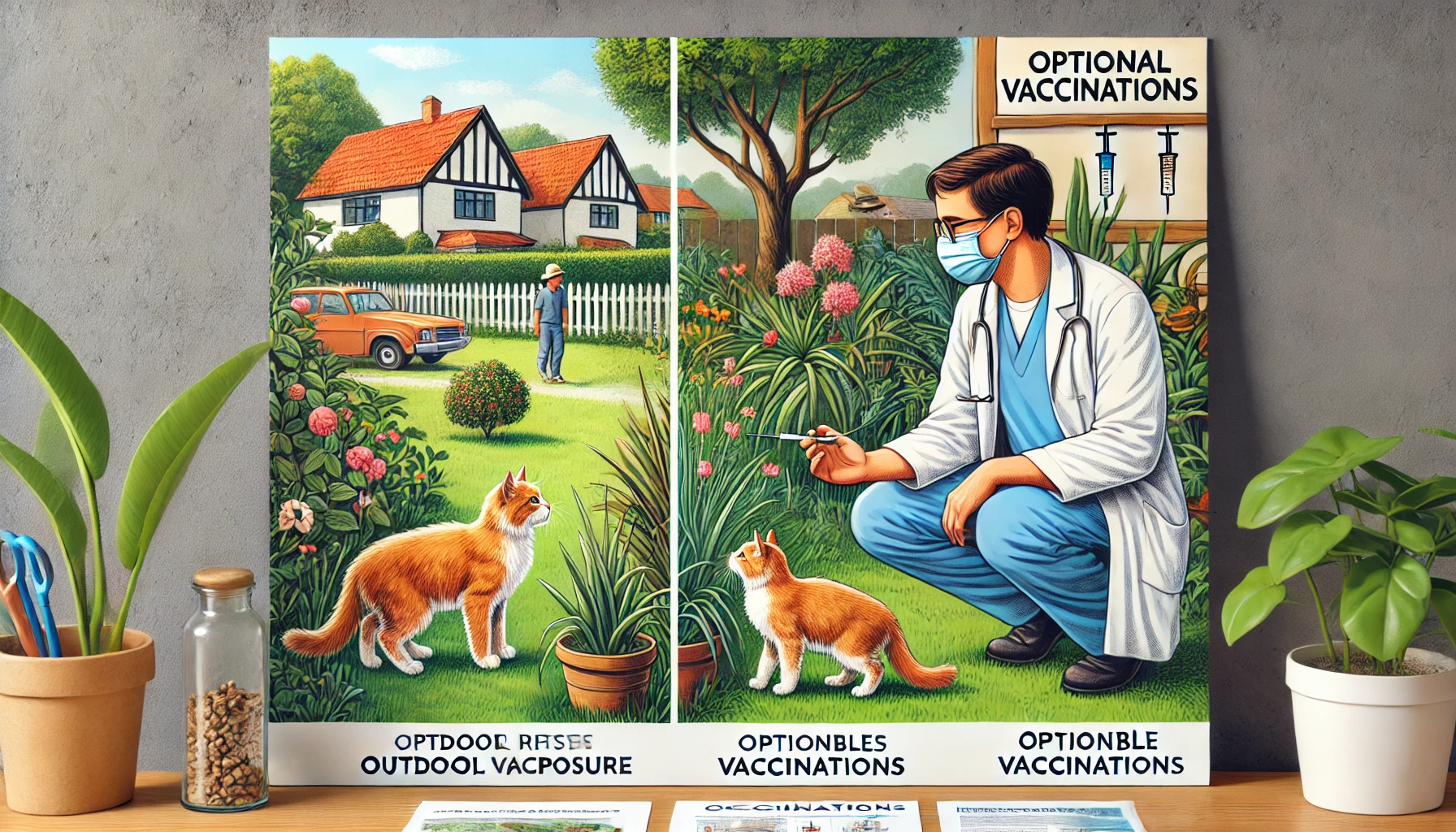
Optional Vaccinations Based on Lifestyle and Location
Besides core vaccinations, optional vaccinations may also be advised depending on your kitten’s lifestyle and where you reside.
These vaccinations may not be necessary for all cats but serve as extra protection for kittens who are more likely to be exposed to specific risks.
Your veterinarian can help determine if these additional vaccinations are needed based on your kitten’s unique circumstances.
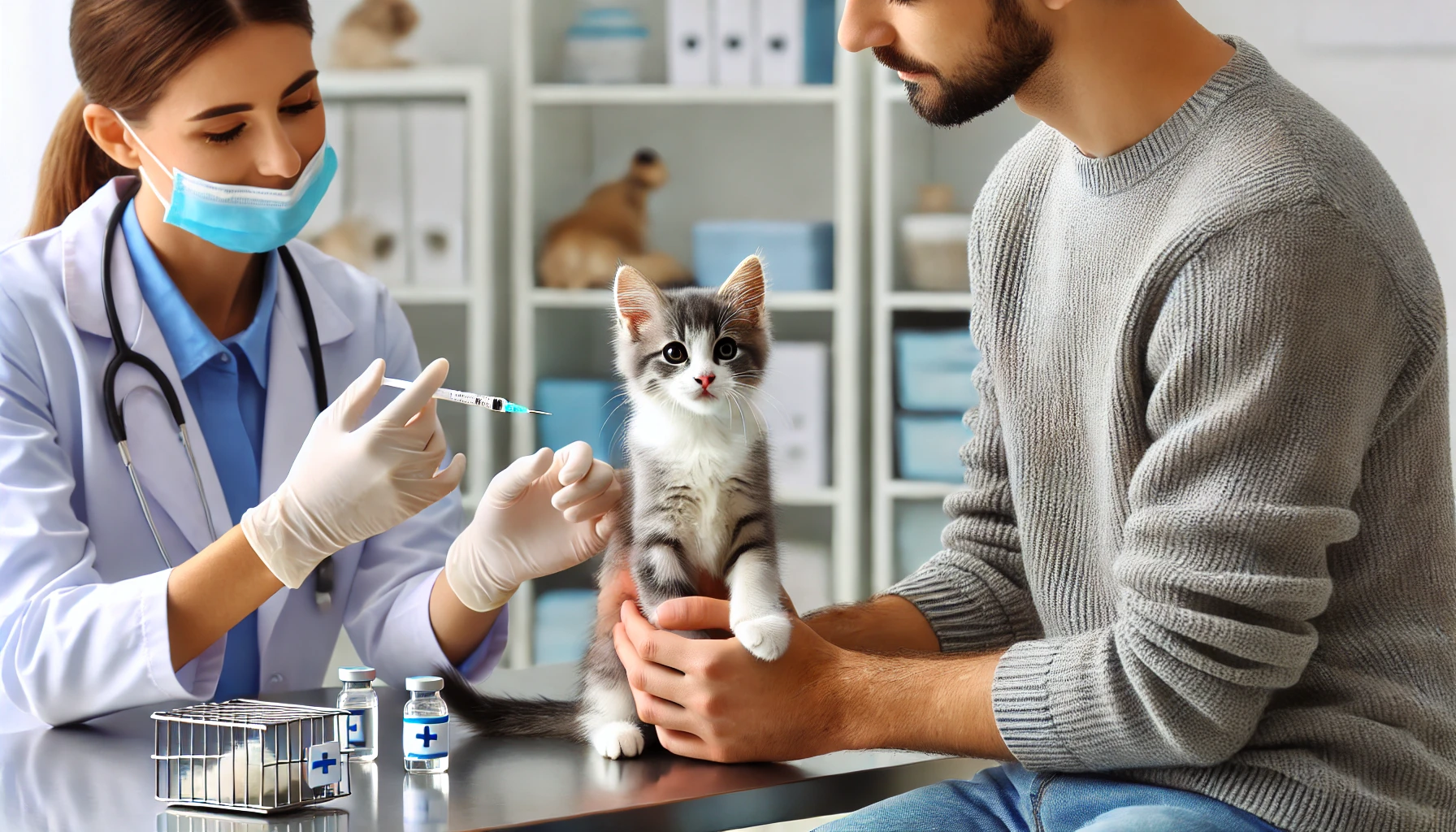
Rabies Vaccination: Do I Have to Vaccinate My Kitten?
While rabies is considered a core vaccine in most places, in some locations or for strictly indoor cats, it might be voluntary.
Rabies is a fatal virus that affects all mammals, including cats and humans.
If your kitten spends time outdoors or if you live in an area where rabies is prevalent, the vaccination is highly recommended.
In many places, rabies vaccination is required by law, regardless of whether your cat stays indoors or outdoors, so it’s important to understand your local legislation.
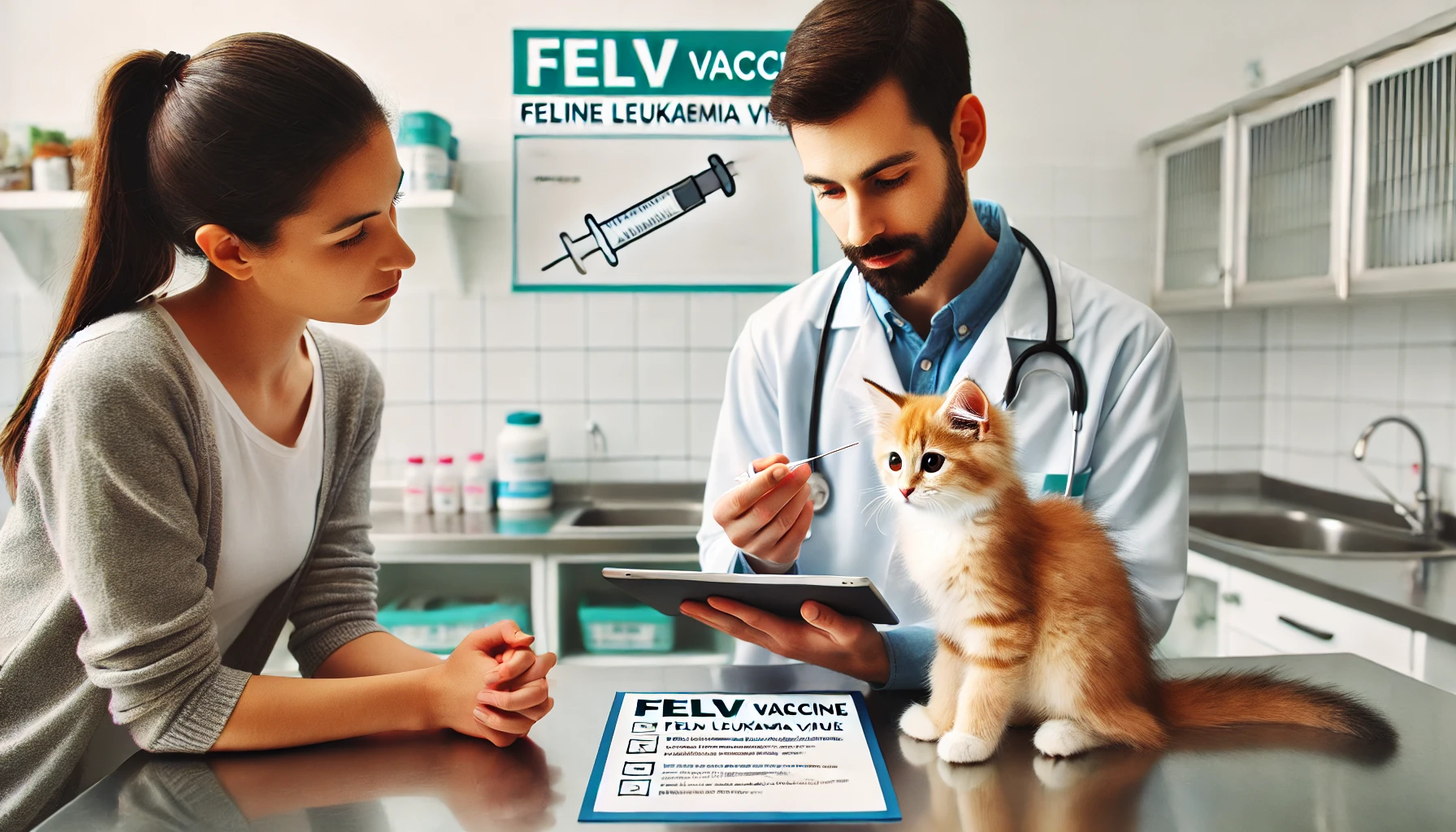
FeLV Vaccine: When Should It Be Considered?
The Feline Leukemia Virus (FeLV) vaccine is another optional vaccination that may be recommended based on your kitten’s risk of exposure.
FeLV is a highly contagious viral infection transmitted through the saliva, urine, or other bodily fluids of an infected cat.
It poses a serious risk to outdoor cats or those in multi-cat households.
Indoor kittens that don’t interact with other cats might not need this vaccine.
However, if your kitten goes outside or has contact with other cats, your veterinarian may advise the FeLV vaccination.
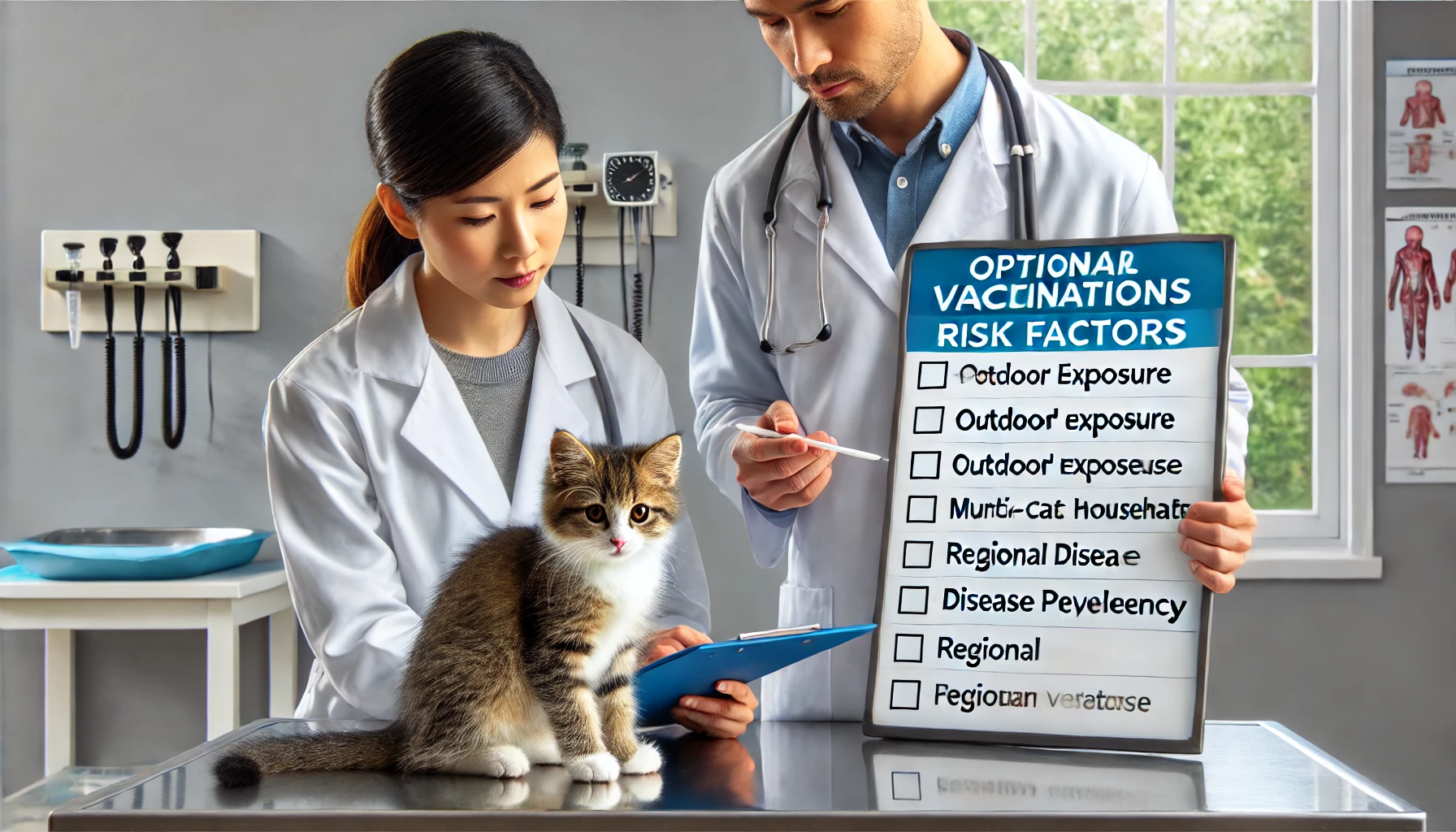
Evaluating Risk Factors for Optional Vaccinations
Some factors to consider when determining whether your kitten requires optional vaccinations include:
- Outdoor Exposure: Kittens with any outdoor exposure, no matter how brief, may encounter other animals, increasing the risk of FeLV or rabies infection.
- Multi-Cat Households: Even if your kitten doesn’t go outside, other cats in the household that do may expose your kitten to diseases like FeLV.
- Regional Prevalence of Diseases: Some regions have a higher prevalence of diseases like rabies or FeLV. Your veterinarian will provide recommendations based on the specific disease risks in your area.
- Health Status: Depending on your kitten’s health and immune system, your veterinarian may recommend optional vaccines to provide additional protection.
By evaluating these risk factors and discussing your kitten’s lifestyle with your veterinarian, you can make informed decisions about which optional vaccinations are necessary.
Understanding the unique risks your kitten may face ensures they receive the protection they need to stay safe and healthy.
Next, let’s discuss what to expect when you take your kitten to the vet for vaccinations and how to care for them afterward.
Optional vaccinations may be advised based on your kitten’s environment and lifestyle, offering additional protection tailored to specific risks they may face.
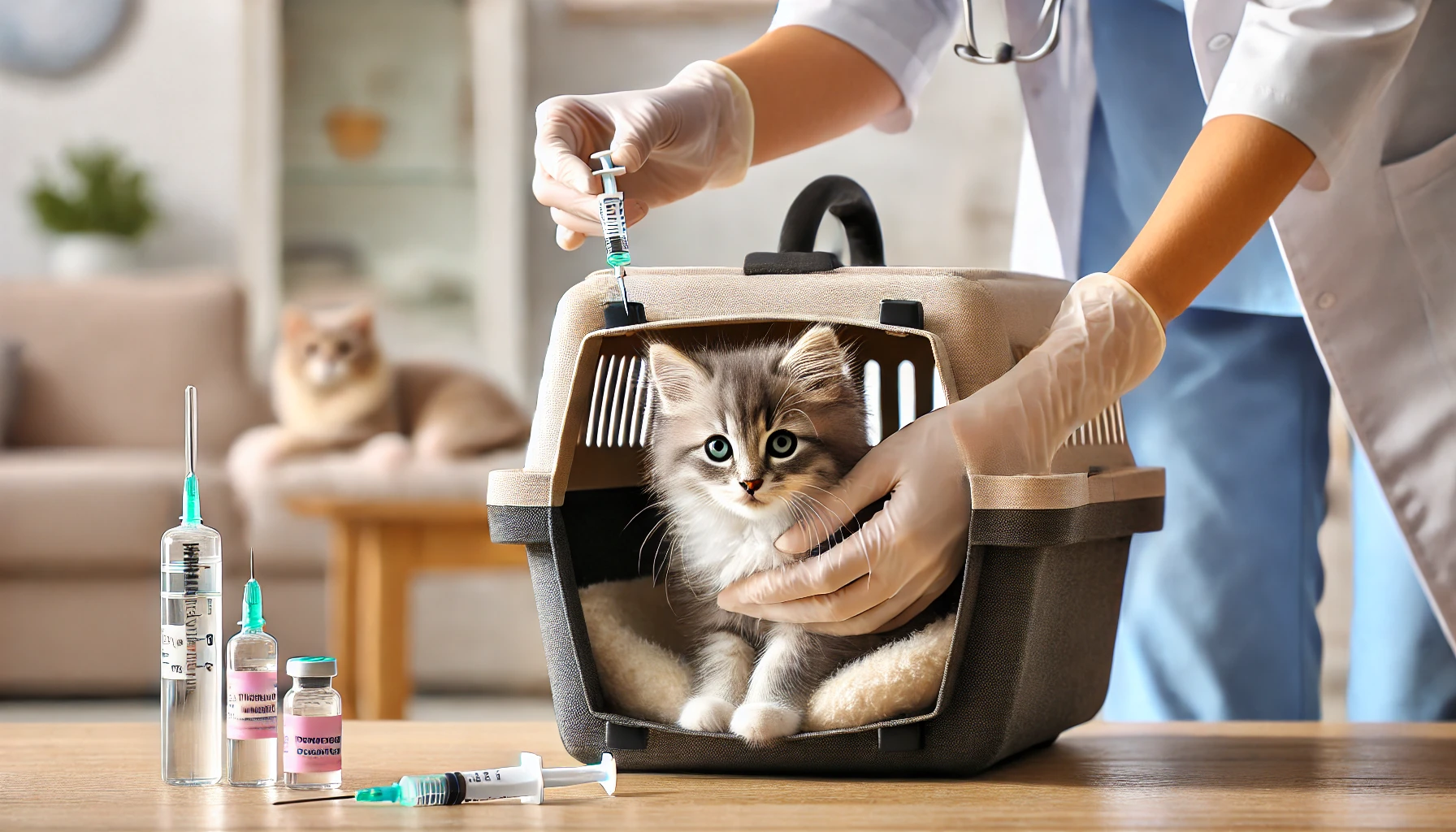
Preparing for Your Kitten’s Vaccination Day
Getting your kitten vaccinated is one of the most important things you can do for their future health, but it’s completely normal to feel a bit apprehensive if you’re unsure about what to expect.
Preparing yourself and your kitten for this process will make it much smoother and less stressful for everyone involved.
Let’s take a step-by-step look at what happens during a typical vet visit and how to care for your kitten afterward.
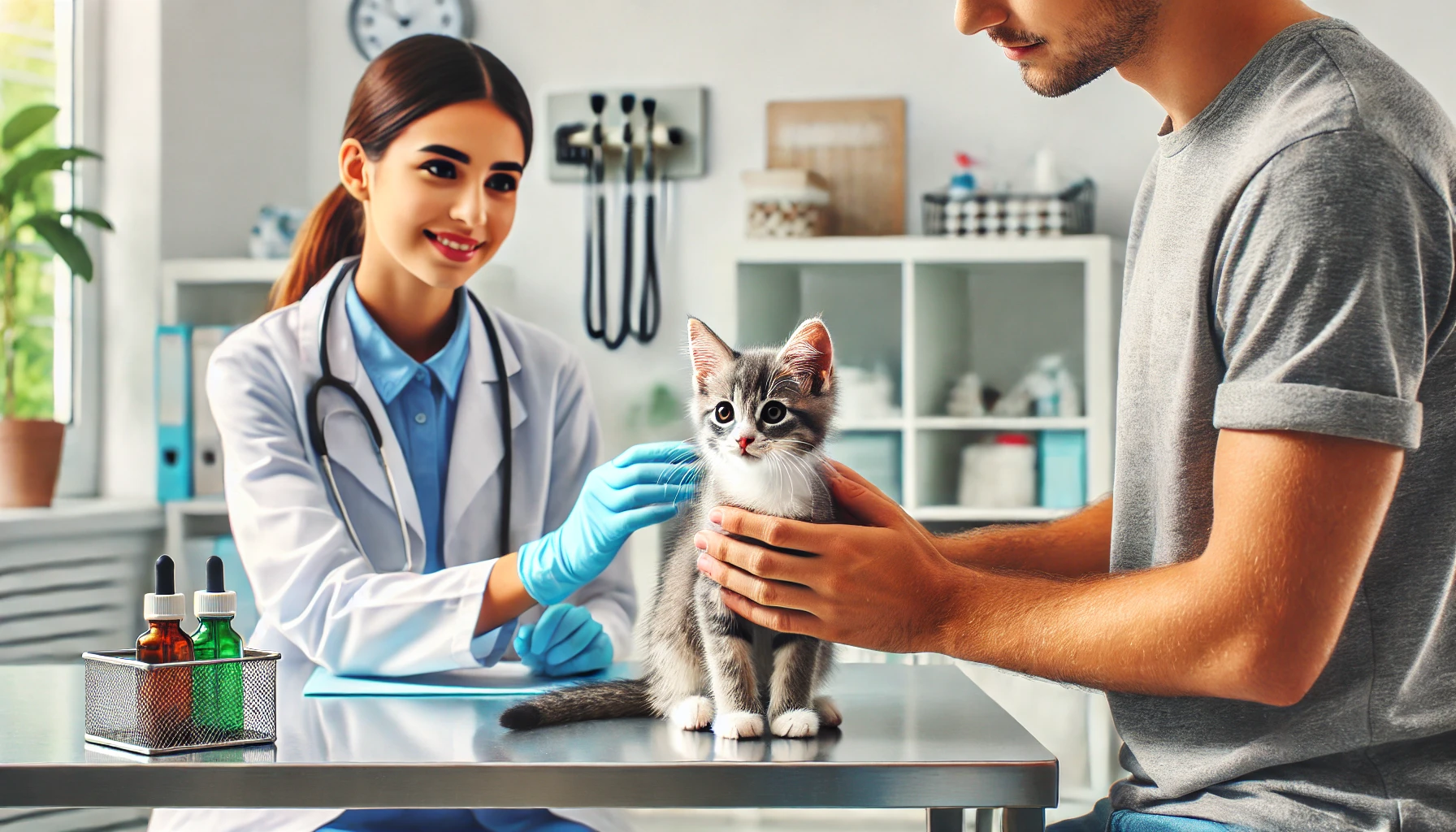
What to Expect at a Veterinarian Visit
Your veterinarian will typically start the appointment by performing a thorough health check before administering the vaccinations.
They will assess your kitten’s overall condition, including examining the eyes, ears, mouth, and listening to the heart and lungs.
This ensures your kitten is healthy enough to receive the vaccinations.
Once the health check is complete, your veterinarian will give the vaccinations via injection.
Vaccines can be administered in the back of the neck, shoulder area, or hind leg.
Most kittens handle vaccinations very well, though some may squirm or feel a bit uncomfortable.
Your vet or veterinary technician will know how to gently restrain your kitten, helping them remain calm and secure during the procedure.
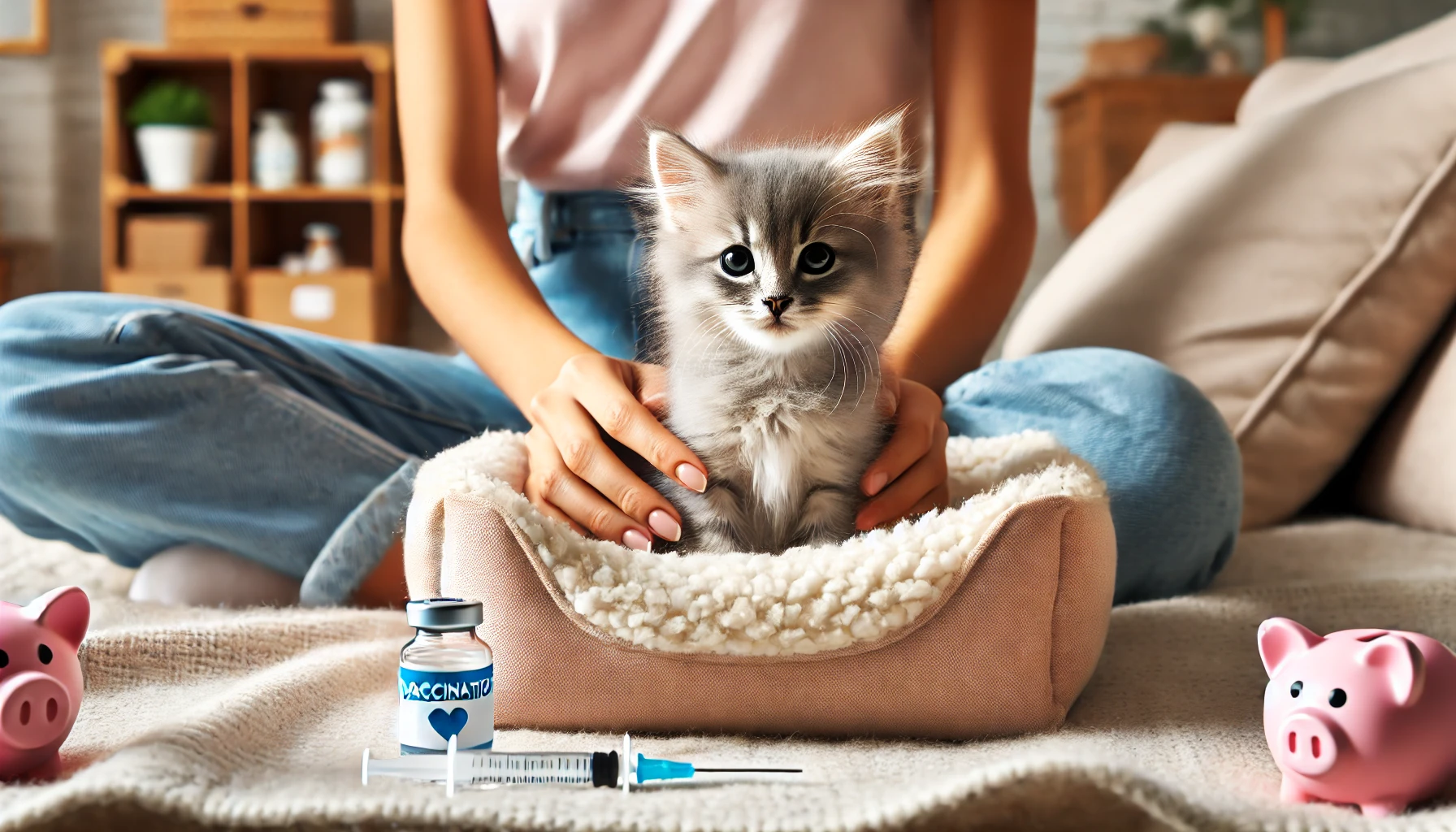
Post-Vaccination Care and Monitoring
After vaccination, your kitten may experience mild side effects such as slight lethargy, a low-grade fever, or soreness at the injection site.
These reactions are usually temporary and should resolve within 24 to 48 hours.
However, it’s important to closely monitor your kitten for any unusual symptoms, such as:
- Swelling at the injection site that persists for more than a couple of days
- Vomiting or diarrhea
- Labored breathing
- Severe lethargy or unresponsiveness
If you notice any of these signs or if your kitten seems distressed, contact your veterinarian right away.
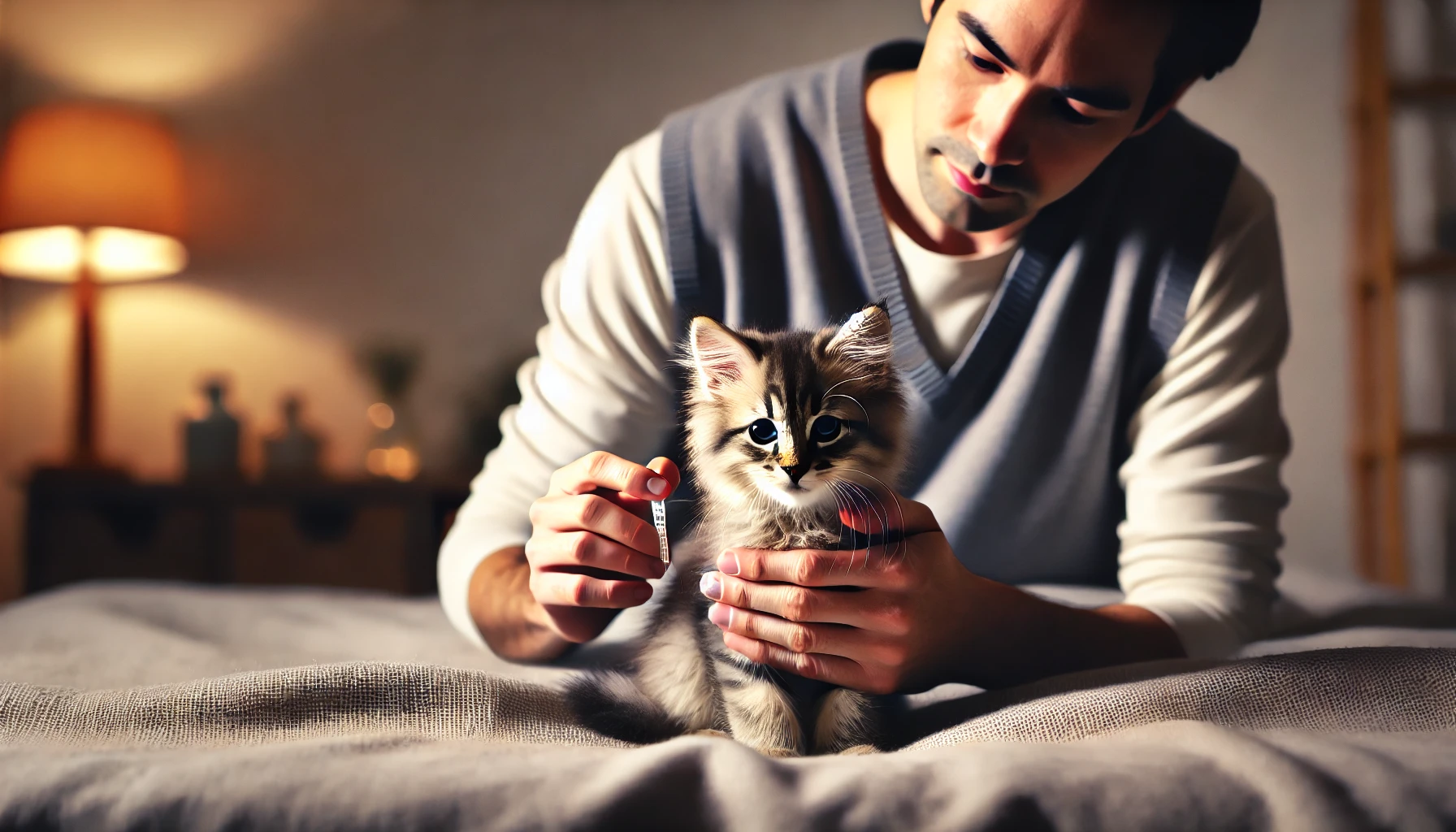
Common Side Effects and When to Contact Your Vet
Though uncommon, some kittens may develop more serious allergic reactions to vaccines.
These reactions can include facial swelling, hives, or difficulty breathing.
These typically occur within minutes to hours after the vaccination.
If you suspect your kitten is having an allergic reaction, contact your vet immediately or seek emergency care.
When you bring your kitten home after vaccinations, a quiet and cozy environment can help them feel more comfortable.
Ensure they have fresh water and their regular food available, but don’t be alarmed if they eat a bit less than usual right after the vaccination.
With proper care and close monitoring, your kitten will quickly bounce back to their normal self.
Now that we’ve gone over the details of vaccination day, you can feel confident that you’re fully prepared to make it a positive experience for your kitten.
Ensure you prepare for vaccination day by knowing what to expect during the visit and how to care for your kitten afterward to help them recover smoothly.
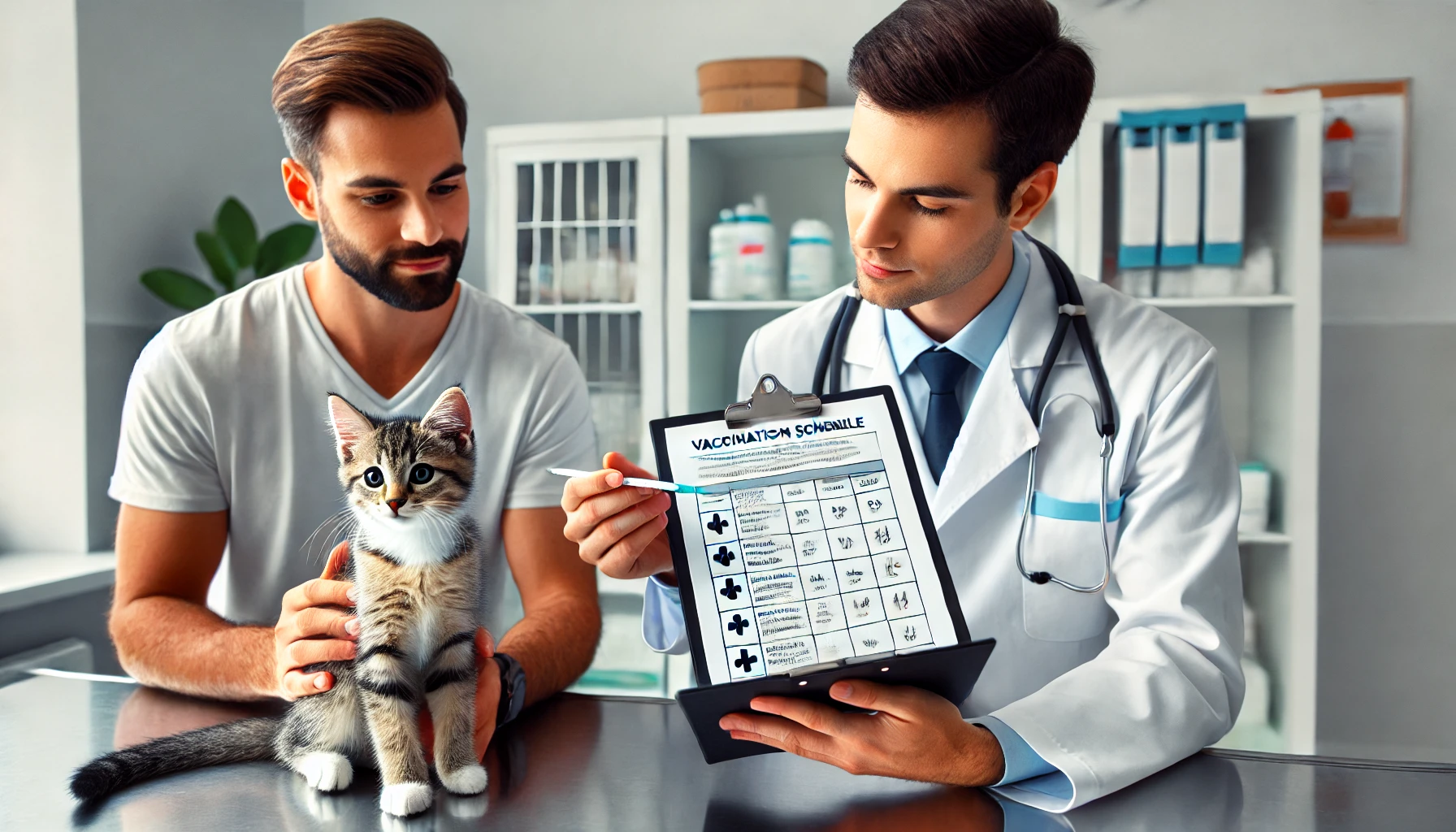
Summary of Your Kitten’s Vaccination Schedule
Following the appropriate vaccination schedule for your kitten is one of the most important things you can do to protect them from potentially life-threatening diseases.
Vaccination schedules are designed to provide kittens with the immunity they need during their most vulnerable stages of life.
Understanding the different types of vaccines and the recommended periods of administration will help give your kitten the best start toward a long and healthy life.
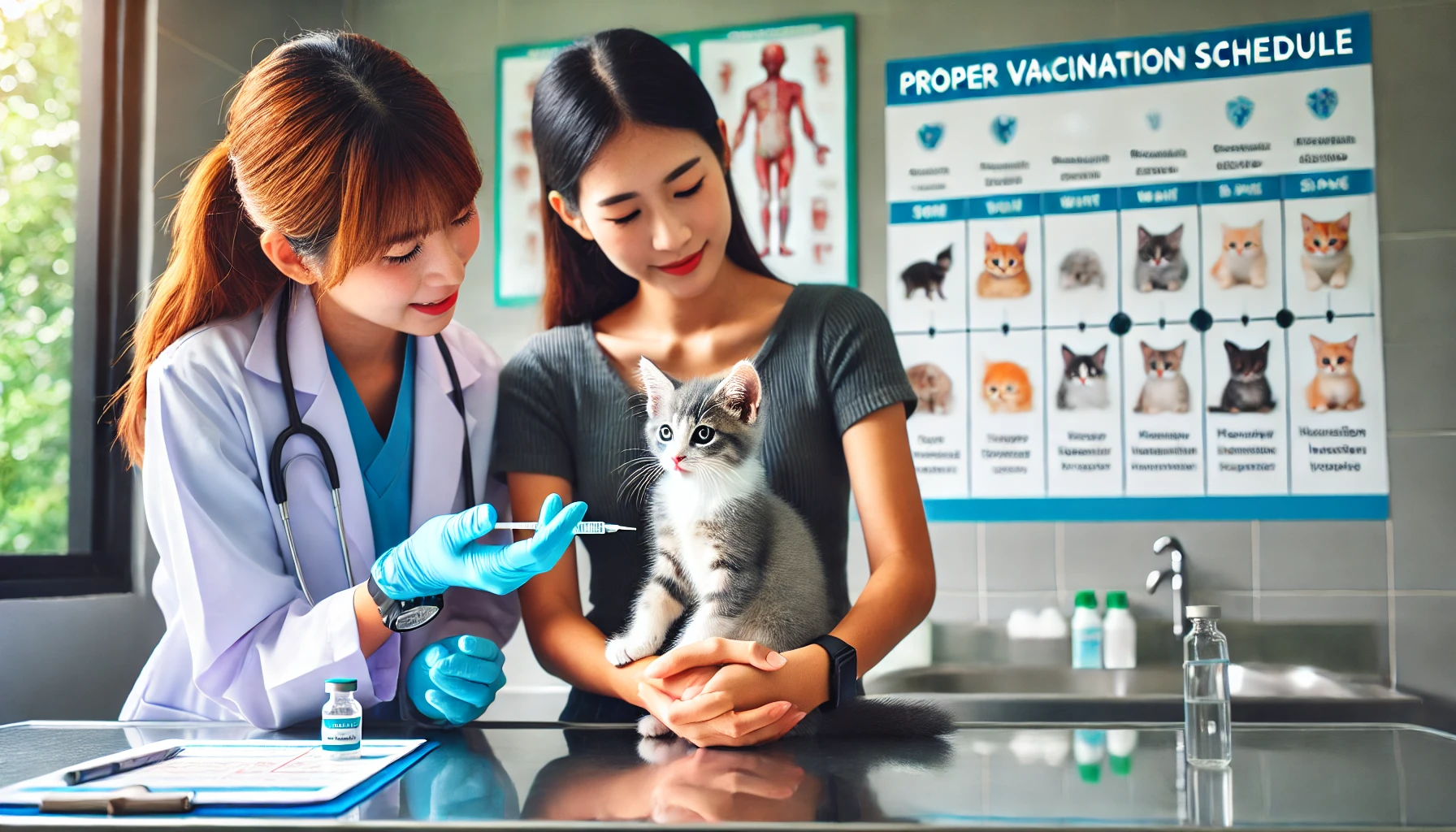
Why Following a Vaccination Schedule Is Crucial
Sticking to a vaccination schedule ensures that your kitten is protected against the most dangerous diseases, including feline viral rhinotracheitis, calicivirus, panleukopenia, and rabies.
These core vaccinations form the foundation of your kitten’s future health, preventing many serious illnesses.
Missing or delaying vaccinations puts your kitten at risk of contracting dangerous viruses, so it is crucial to follow the timeline suggested by your veterinarian.
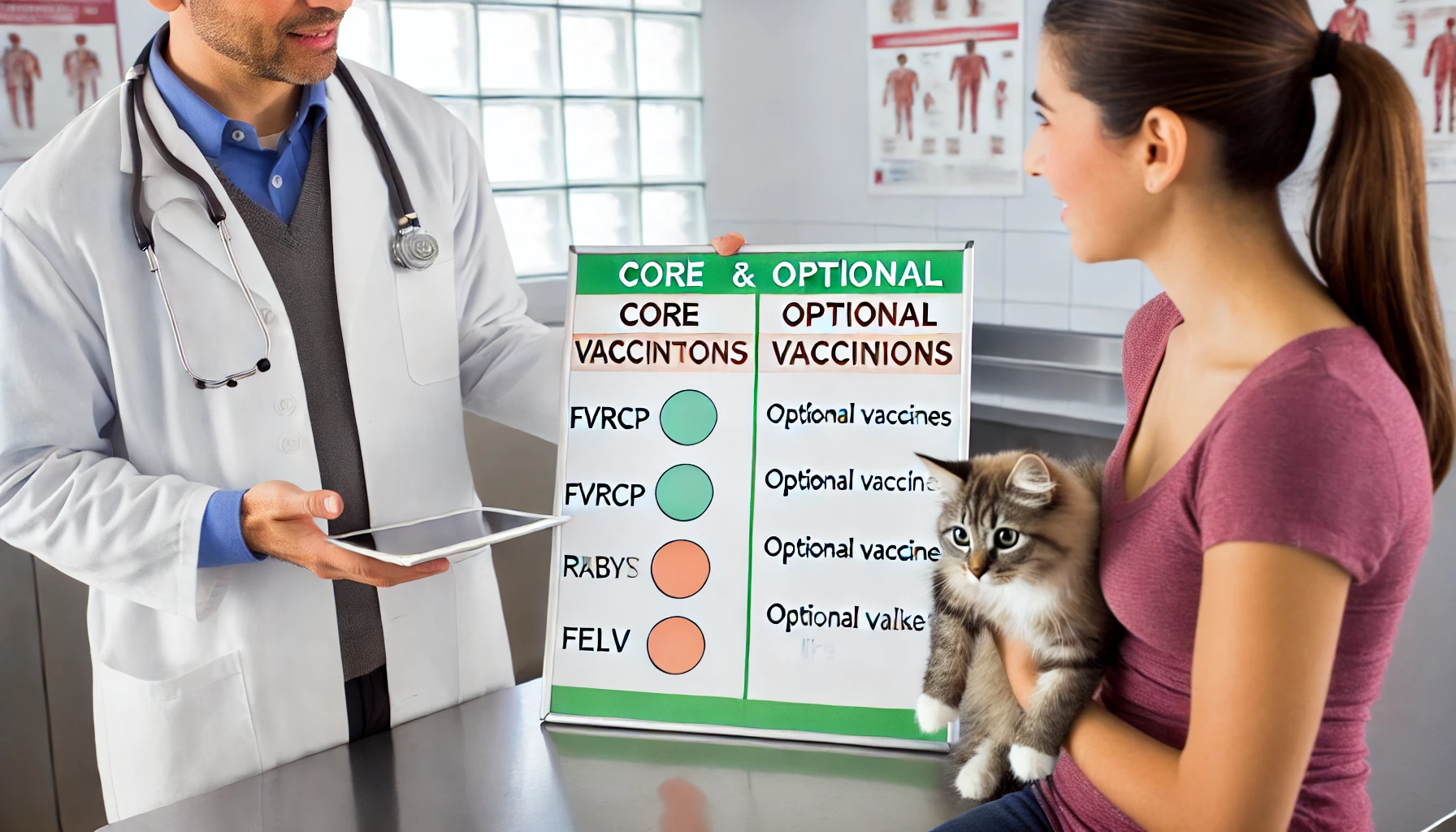
Core and Optional Vaccinations
While core vaccinations are essential for all kittens, there are some optional vaccinations that your veterinarian may recommend depending on your kitten’s lifestyle and location.
Vaccines such as the Feline Leukemia Virus (FeLV) vaccine may be necessary if your kitten goes outdoors or if you have multiple cats in your household.
In some regions, the rabies vaccine may be optional.
Be sure to discuss your kitten’s daily habits and potential risk factors with your vet to determine which optional vaccinations are needed.
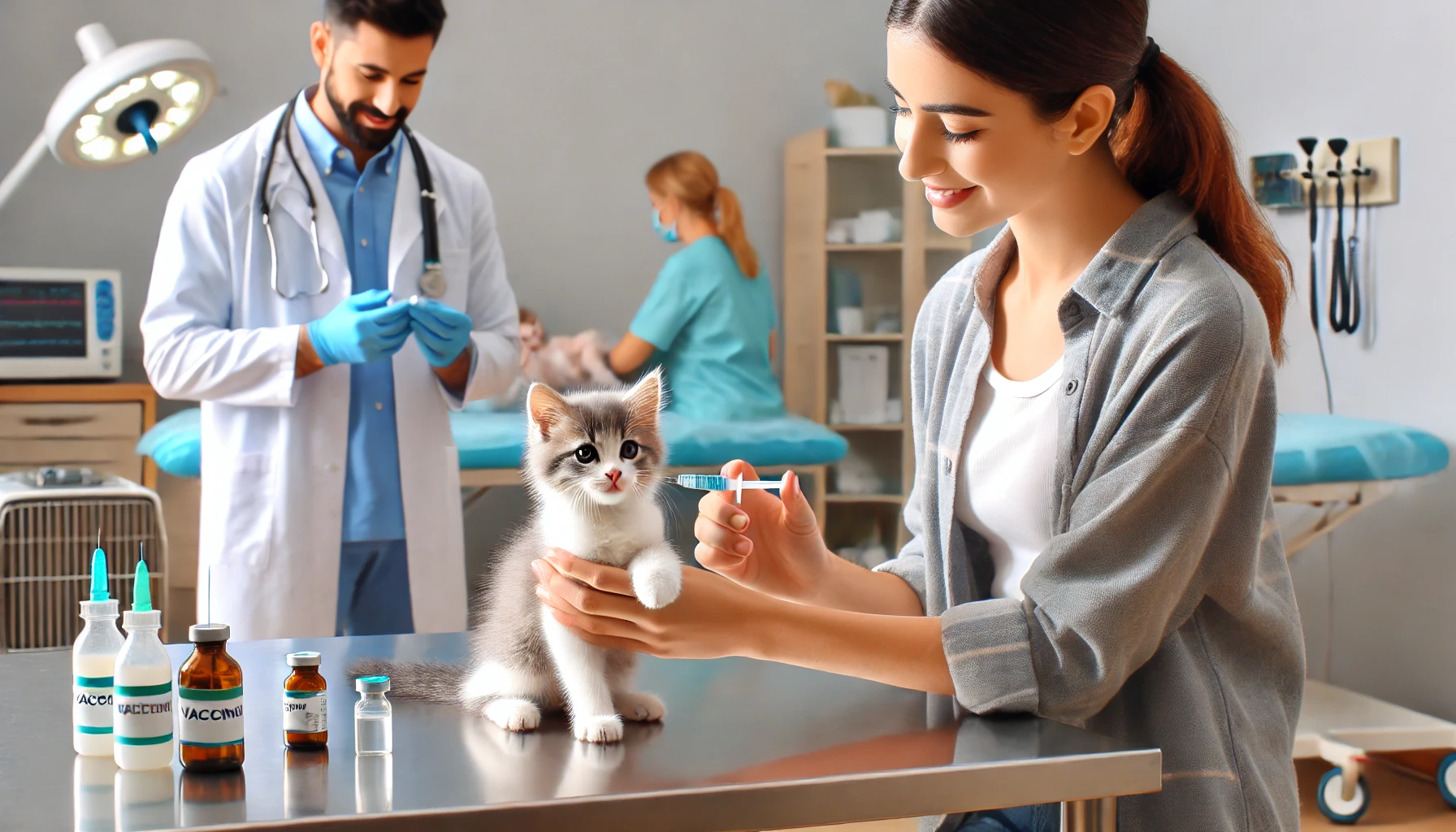
What to Expect on Vaccination Day
Understanding what happens during a typical vet visit can help alleviate any stress you may feel about the vaccination process.
Your veterinarian will start by conducting a thorough health examination to ensure your kitten is fit to receive vaccinations.
After the vaccinations, your kitten may experience mild lethargy or soreness at the injection site, but these side effects are usually short-lived.
Monitoring your kitten closely and providing them with a quiet space will help them recover quickly.
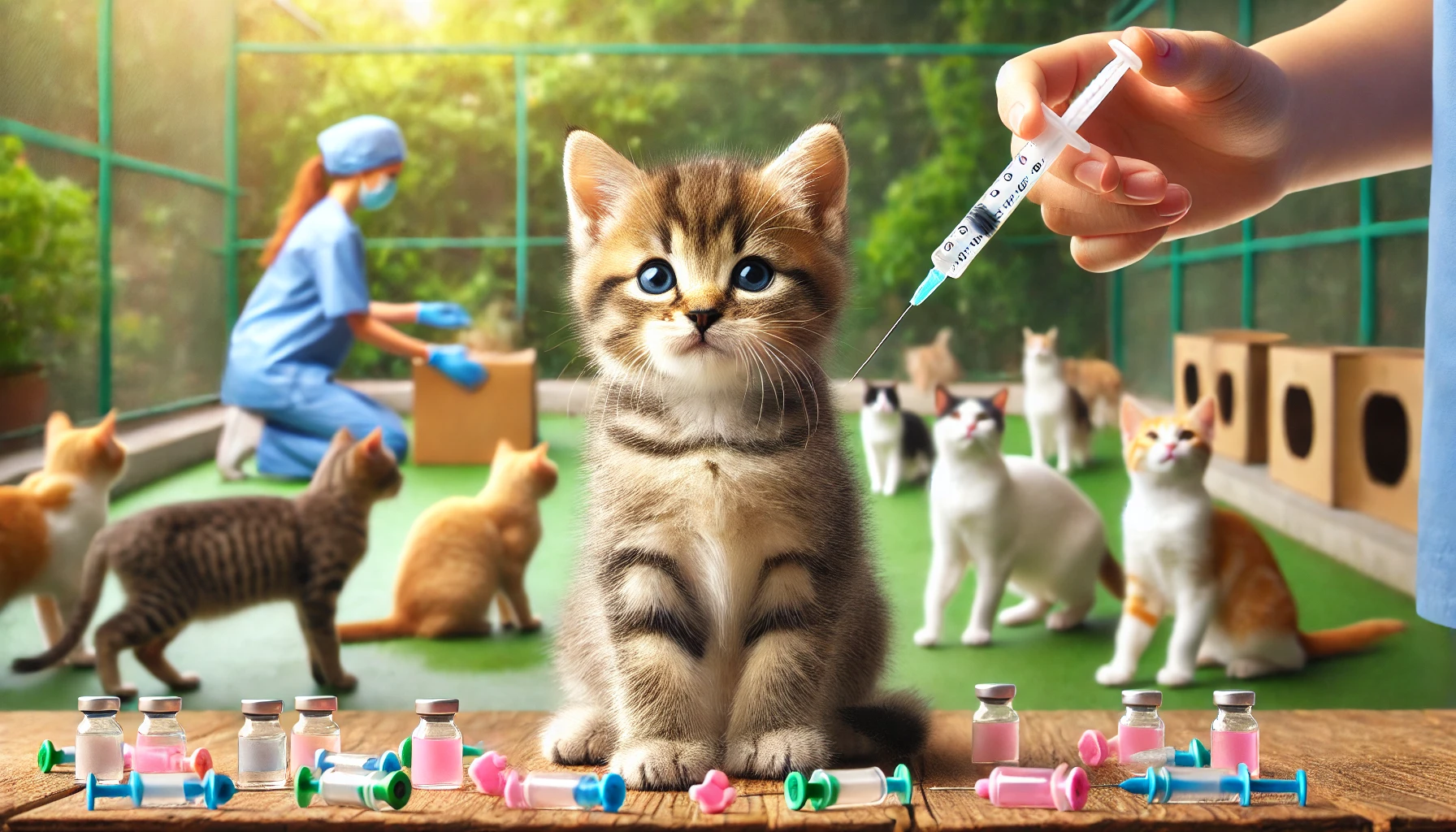
Protecting Your Kitten and the Greater Cat Community
By following a recommended vaccination schedule, you’re not only protecting your kitten but also contributing to the overall health of the feline community.
Vaccinations help prevent outbreaks of diseases that can spread rapidly among cats.
This protection is especially important in multi-cat households or neighborhoods where cats interact frequently.
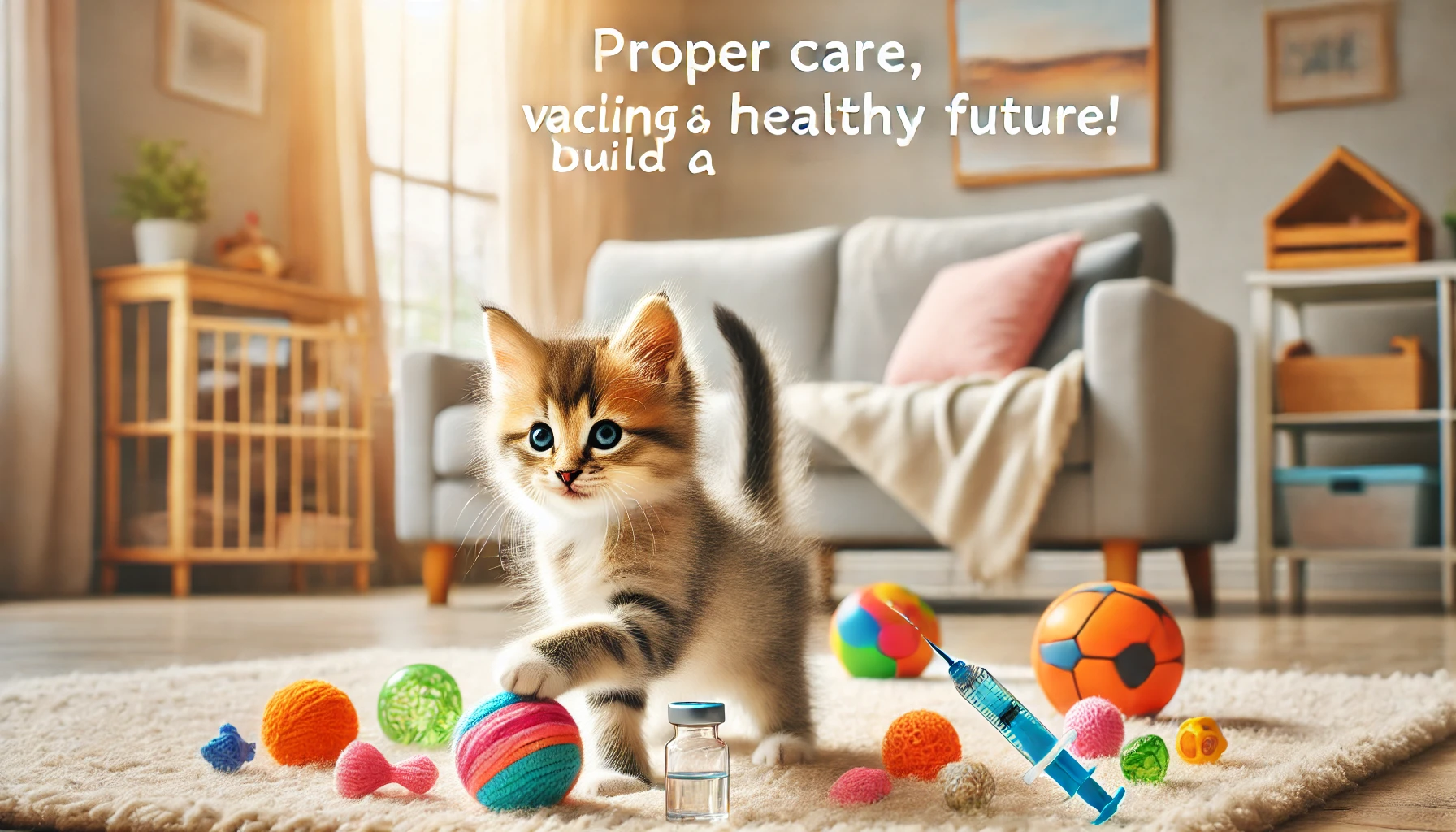
How to Build a Healthier Future for Your Kitten
Vaccination schedules are a crucial part of responsible pet care.
By understanding your kitten’s vaccination needs and adhering to the appropriate timeline, you’re giving your kitten the best chance to grow and thrive.
Stay in communication with your veterinarian to stay updated on when your kitten will need future vaccinations, as the care you provide now will benefit your kitten for years to come.
Following the proper vaccination schedule is essential to protect your kitten from severe diseases, providing immunity during the critical early stages of their life.
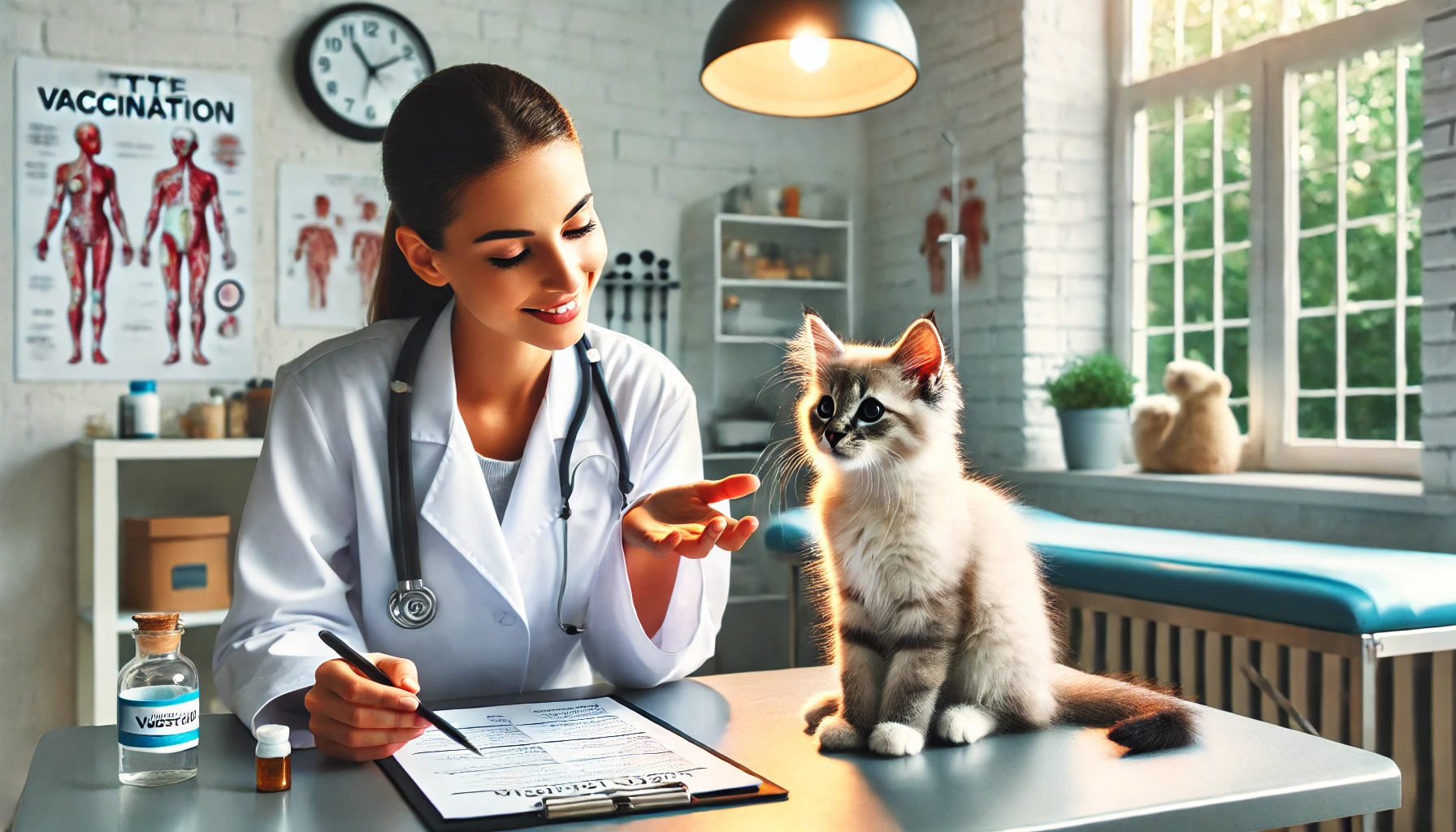
Frequently Asked Questions About Kitten Vaccination Schedules
The following are some of the most frequently asked questions about kitten vaccination schedules, helping you gain a better understanding and ensure your kitten’s long-term health and well-being.
When do I need to vaccinate my kitten?
Vaccinations should ideally be done between six to eight weeks of age.
This ensures your kitten gets the necessary protection during their most delicate stages of development.
How often does my kitten need booster vaccinations?
Your kitten will need boosters every three to four weeks after the initial vaccinations, until they reach 16 weeks old.
Afterward, booster shots are given yearly or every three years, depending on your vet’s recommendations.
What are considered the core vaccinations for kittens?
Core vaccinations include those for feline viral rhinotracheitis, calicivirus, panleukopenia, and rabies.
These vaccinations are essential as they protect against common and often deadly diseases in kittens.
Does an indoor cat need a rabies vaccination?
In many regions, rabies vaccination is required by law, even for indoor cats.
Consult local regulations and talk to your veterinarian to determine if your kitten needs the rabies vaccine.
Can kittens have side effects from vaccines?
Kittens may experience mild side effects such as lethargy, soreness at the injection site, or a low-grade fever.
These symptoms typically subside within 24 to 48 hours after vaccination.
What if my kitten missed a vaccination?
Missing a vaccination leaves your kitten vulnerable to serious diseases.
If this happens, consult your vet immediately to reschedule and ensure your kitten receives the protection they need.
Are there optional vaccines my kitten might need?
Depending on your kitten’s lifestyle and exposure risk, your vet may recommend optional vaccines, such as the Feline Leukemia Virus (FeLV) vaccine.
This is especially important for outdoor cats or those in multi-cat households.
How do vaccines protect my kitten?
Vaccines introduce a harmless portion of a virus or bacteria to your kitten’s immune system, allowing it to develop antibodies.
These antibodies protect your kitten from future exposure to the actual disease.
What should I do if my kitten has an allergic reaction to a vaccine?
If your kitten shows signs of facial swelling, hives, or difficulty breathing after a vaccination, seek veterinary or emergency care immediately, as these symptoms may indicate an allergic reaction.

